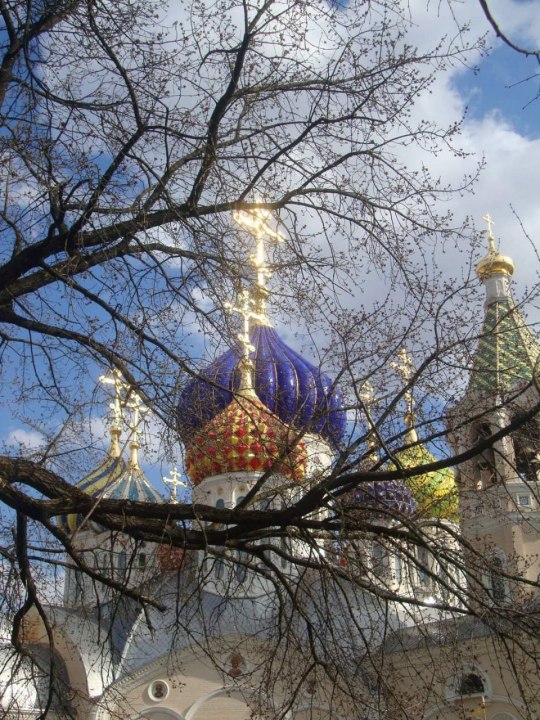Text
Saints&Reading: Friday, April 26, 2024
april 13_april 26
THE PRIESTMARTYR ARTEMON OF LAODICEA IN SYRIA (303)
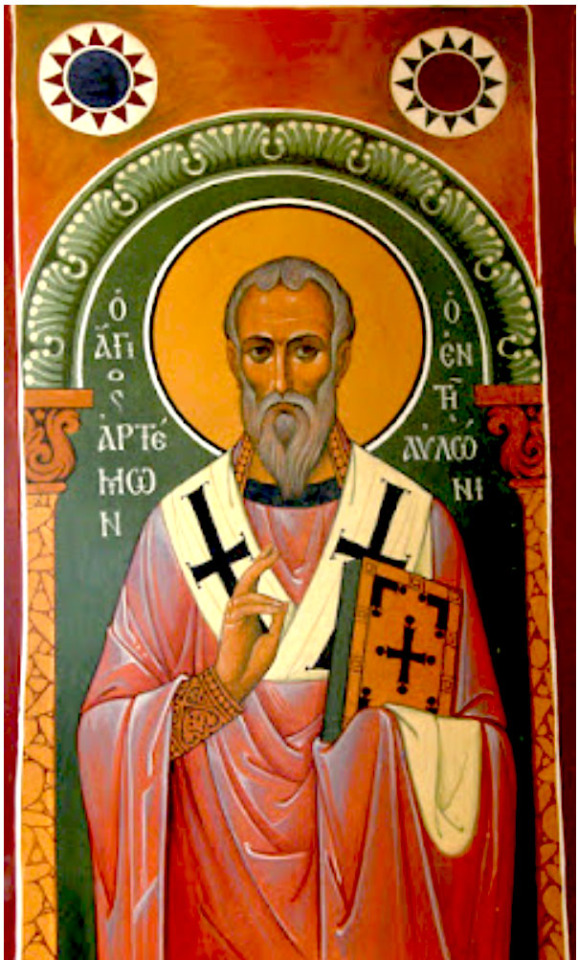
The Hieromartyr Artemon (Artémon) was born of Christian parents in Laodikeia (Laodίkeia), Syria in the III century. From his youth, he devoted himself to the service of the Church, and was a Reader for sixteen years. For his zeal, Bishop Sisίnnius ordained him as a Deacon. Saint Artemon also carried out this service with fervor and diligence for twenty-eight years, then he was ordained to the priesthood. In that position, Saint Artemon served the Church of God for another thirty-three years, preaching Christianity among pagans. When Emperor Diocletian (reigned 284-305) began his fierce persecution of the Church, issuing an edict ordering Christians to offer sacrifice to the idols, Saint Artemon was already quite old.
Knowing of the impending arrival of the military commander Patricius at Laodikeia, Saint Sisίnnius went with the priest Artemon and some other Christians into the temple of the "goddess" Artemis. There they smashed and burned the idols, reducing them all to dust.
Afterward, Saint Sisίnnius and Saint Artemon gathered the flock into the church and fervently exhorted the Christians to remain firm in the Faith, and not to fear the threats of torturers.
When he arrived in Laodikeia, Patricius celebrated a five-day festival in honor of the pagan "gods," and then entered the temple of Artemis to offer sacrifice. When he was told who had destroyed the temple, he went with a detachment of soldiers to the church where the Christians were praying.
As he approached the church, Patricius suddenly felt a chill, and then developed a fever, which left him scarcely alive. He was carried him home and put to bed. “The Christians have put a curse on me, and their God torments me,” he said to those around him. Although Patricius prayed to the idols, they did not relieve his sufferings. He sent a messenger to Bishop Sisίnnius, asking for his help, and promised to set up a gold statue of that Hierarch in the middle of the city. The Saint replied, “Keep your gold, but if you believe in Christ, He will heal you.”
Patricius was afraid of death, so he declared that he believed in Christ, and the affliction left him. But even this miracle did not affect the obdurate pagan's soul. Although he did not raise a hand against Bishop Sisίnnius, he did enforce the imperial edict against other Christians in the city of Caesarea.
Along the way he encountered Saint Artemon, who was followed by six wild donkeys and two deer. When Patricius asked how he was able to control these wild beasts, Saint Artemon replied that he held them with the Word of Christ. Patricius learned from the idolaters that it was Artemon who had destroyed the pagan temple of Artemis, so he ordered that Artemon be arrested and taken to the city of Caesarea. The Saint went with the soldiers without fear, but he told the animals to go to Saint Sisίnnius. Seeing the animals, Bishop Sisίnnius asked, “Why have these animals come here?”
A doe received the gift of speech from God and said, “The servant of God Artemon is being held by the impious Patricius, and is being brought to Caesarea in chains. He commanded us to come here to give you this news.”
Do not be astonished that the Lord, Who opened the mouth of Balaam’s ass (Numbers 22:28), also permitted the doe to speak. The Bishop sent Deacon Phileas to Caesarea to verify what he had been told.
At Caesarea, Patricius brought Saint Artemon to trial and tried to force him to offer sacrifice in the temple of Asclepius. In that pagan temple there were many poisonous vipers. The pagan priest never opened the doors, nor did he place the sacrifice before the idol. But Saint Artemon, calling on the Name of Jesus Christ, went into the temple and drove the snakes out. The pagans fled, but the Saint stopped them and killed the snakes by his breath. Vitalius, one of the pagan priests, believed in Christ and asked Saint Artemon to baptize him.
Patricius thought that Saint Artemon killed the snakes by sorcery, and again he interrogated and tortured him. Then the doe which had spoken arrived at Caesarea. She lay down at the Martyr's feet, licking his wounds. By God’s command the doe spoke again, denouncing the impious pagans. Addressing Patricius, the doe predicted that he would be seized by two birds of prey, and dropped into a cauldron of burning pitch. Patricius was enraged because he had been censured by a wild beast. He commanded his soldiers to shoot the doe with arrows, but she escaped. Afraid that the miracles performed by Saint Artemon would attract more people to him, Patricius ordered his execution.
An enormous cauldron was filled with boiling pitch, and the soldiers intended to throw Saint Artemon into it. But when Patricius rode up to the cauldron on horseback to see if the pitch was indeed boiling, two Angels in the form of eagles seized him and dropped him into the cauldron. His body was consumed so that not a single bone remained, but Saint Artemon survived.
Seeing this miracle, everyone ran away except Saint Artemon, who blessed and glorified God. When the Saint finished his prayer, a spring of water gushed forth from the ground. Saint Artemon baptized the pagan priest Vitalius and many pagans, who had come to believe in Christ. On the following morning, Saint Artemon communed the newly-baptized with the Holy Mysteries. Many of the baptized were ordained to the diaconate and the priesthood, and Vitalius was made Bishop of Palestine.
The Bishop of Caesarea came to visit Saint Artemon, noting the place where he had suffered. Subsequently, a church was built on that site.
Instructed by God's voice, Saint Artemon preached the Gospel in Asia Minor. Then an Angel appeared and transported him to the place which had been revealed to him, and there he converted many to Christ. The pagans arrested the Saint and beheaded him († 303).
In the Roman Martyrology, Saint Artemon is listed under October 8, while in Greek usage he is commemorated on April 12.
Saint Artémon the Presbyter of Laodikeia should not be confused with Saint Artemon the Bishop of Seleukeia (March 24).
THE HOLY MARTYR THOMAIS OF ALEXANDRIA (476)

The Holy Martyr Thomais (Thomaίs) was born into a Christian family in the city of Alexandria. She was raised in piety, and loved to read spiritual books.
When she was fifteen, Thomais married a fisherman, who was also a Christian. The young couple lived in the home of her husband’s family, where Saint Thomaίs was loved for her mild and gentle disposition, and for her other good traits.
Her father-in-law, at the prompting of the devil, was captivated by her beauty. One night, when his son went out fishing, he attempted to lead his daughter-in-law into sin. Horrified, Saint Thomais admonished the senseless old man, reminding him of the Last Judgment and the penalty for sin. Infuriated by her steadfastness, he grabbed a sword and threatened to cut off her head. Saint Thomaίs replied: “Even if you cut me to pieces, I shall not stray from the Lord's commandments.” Overcome with passion, the old man cut Saint Thomais in two with the sword. Thus, the Saint received the crown of martyrdom in the year 476.
Divine punishment overtook the murderer. He was struck blind and could not find the door in order to escape. The next morning, the friends of the Saint’s husband came to the door. They saw her body, and the blind old man covered with blood. The murderer confessed his evil deed and asked to be taken to the judge for punishment. He was then beheaded for his crime.
At this time, Saint Daniel of Skete (Skḗtē) (June 7) happened to be in Alexandria. He told the monks of the Oktokaidekaton Monastery (at the eighteenth milestone on the road leading west from Alexandria) to bring the Martyr's body to the Monastery and bury her in the cemetery with the departed Fathers. Some of the monks were scandalized because he wanted to bury a woman’s body with the monks. Saint Daniel replied, “She is a mother to me and to you, because she died for her chastity.”
After the funeral Saint Daniel returned to Skete. Soon one of the young monks confessed to him that he was being tormented by carnal passions. Saint Daniel ordered him to go and pray at the grave of the Holy Martyr Thomais. The monk obeyed the Elder. As he prayed at the grave, he fell into a light sleep. Saint Thomaίs appeared to him and said, “Father, receive my blessing and go in peace.”
When he awakened, the monk felt joy and peace in his soul. After this, he told Saint Daniel that he was no longer bothered by the temptations of the flesh. Abba Daniel exclaimed, “Great is the boldness of those who have struggled for chastity.”
Many found both spiritual joy and release from their passions at the grave of Saint Thomais. Her holy relics were transferred to Constantinople to one of the women’s monasteries. The Russian pilgrim Archdeacon Zosimas venerated them in 1420.
Saint Thomais is invoked by those seeking deliverance from sexual impurity. Other Saints whose intercession we seek for this purpose are: Saint John the Much-Suffering (July 18), and Saint Moses the Hungarian (July 26).
Part of the Saint's Holy Skull is located in the Holy Monastery of Dionysiou on Mount Athos.
In Greek usage, Saint Thomaίs is commemorated on April 14.


ISAIAH 66:10-24
10 “Rejoice with Jerusalem, And be glad with her, all you who love her; Rejoice for joy with her, all you who mourn for her; 11 That you may feed and be satisfied With the consolation of her bosom, That you may drink deeply and be delighted With the abundance of her glory.” 12 For thus says the Lord: “Behold, I will extend peace to her like a river, And the glory of the Gentiles like a flowing stream. Then you shall feed; On her sides shall you be carried, And be dandled on her knees. 13 As one whom his mother comforts, So I will comfort you; And you shall be comforted in Jerusalem.” 14 When you see this, your heart shall rejoice, And your bones shall flourish like grass; The hand of the Lord shall be known to His servants, And His indignation to His enemies. 15 For behold, the Lord will come with fire And with His chariots, like a whirlwind, To render His anger with fury, And His rebuke with flames of fire. 16 For by fire and by His sword The Lord will judge all flesh; And the slain of the Lord shall be many. 17 “Those who sanctify themselves and purify themselves, To go to the gardens After an idol in the midst, Eating swine’s flesh and the abomination and the mouse, Shall be consumed together,” says the Lord 18 “For I know their works and their thoughts. It shall be that I will gather all nations and tongues; and they shall come and see My glory. 19 “I will set a sign among them; and those among them who escape I will send to the nations: to Tarshish and Pul and Lud, who draw the bow, and Tubal and Javan, to the coastlands afar off who have not heard My fame nor seen My glory. And they shall declare 20 “Then they shall bring all your brethren for an offering to the Lord out of all nations, on horses and in chariots and in litters, on mules and on camels, to My holy mountain Jerusalem,” says the Lord, “as the children of Israel bring an offering in a clean vessel into the house of the Lord. 21 “And I will also take some of them for priests and Levites,” says the Lord. 22 “For as the new heavens and the new earth Which I will make shall remain before Me,” says the Lord, “So shall your descendants and your name remain. 23 And it shall come to pass That from one New Moon to another, And from one Sabbath to another, All flesh shall come to worship before Me,” says the Lord. 24 “And they shall go forth and look Upon the corpses of the men Who have transgressed against Me. For their worm does not die, And their fire is not quenched. They shall be an abhorrence to all flesh.”
GENESIS 49:33-50:26
33 And when Jacob had finished commanding his sons, he drew his feet up into the bed and breathed his last, and was gathered to his people.
1 Then Joseph fell on his father’s face, and wept over him, and kissed him. 2 And Joseph commanded his servants the physicians to embalm his father. So the physicians embalmed Israel. 3 Forty days were required for him, for such are the days required for those who are embalmed; and the Egyptians mourned for him seventy days. 4 Now when the days of his mourning were past, Joseph spoke to the household of Pharaoh, saying, “If now I have found favor in your eyes, please speak in the hearing of Pharaoh, saying, 5 ‘My father made me swear, saying, “Behold, I am dying; in my grave which I dug for myself in the land of Canaan, there you shall bury me.” Now therefore, please let me go up and bury my father, and I will come back.’ ” 6 And Pharaoh said, “Go up and bury your father, as he made you swear.” 7 So Joseph went up to bury his father; and with him went up all the servants of Pharaoh, the elders of his house, and all the elders of the land of Egypt, 8 as well as all the house of Joseph, his brothers, and his father’s house. Only their little ones, their flocks, and their herds they left in the land of Goshen. 9 And there went up with him both chariots and horsemen, and it was a very great gathering. 10 Then they came to the threshing floor of Atad, which is beyond the Jordan, and they mourned there with a great and very solemn lamentation. He observed seven days of mourning for his father. 11 And when the inhabitants of the land, the Canaanites, saw the mourning at the threshing floor of Atad, they said, “This is a deep mourning of the Egyptians.” Therefore its name was called Abel Mizraim, which is beyond the Jordan. 12 So his sons did for him just as he had commanded them. 13 For his sons carried him to the land of Canaan, and buried him in the cave of the field of Machpelah, before Mamre, which Abraham bought with the field from Ephron the Hittite as property for a burial place. 14 And after he had buried his father, Joseph returned to Egypt, he and his brothers and all who went up with him to bury his father. 15 When Joseph’s brothers saw that their father was dead, they said, “Perhaps Joseph will hate us, and may actually repay us for all the evil which we did to him.” 16
So they sent messengers to Joseph, saying, “Before your father died he commanded, saying,
17 ‘Thus you shall say to Joseph: “I beg you, please forgive the trespass of your brothers and their sin; for they did evil to you.” ’ Now, please, forgive the trespass of the servants of the God of your father.” And Joseph wept when they spoke to him. 18 Then his brothers also went and fell down before his face, and they said, “Behold, we are your servants.” 19 Joseph said to them, “Do not be afraid, for am I in the place of God? 20 “But as for you, you meant evil against me; but God meant it for good, in order to bring it about as it is this day, to save many people alive. 21 “Now therefore, do not be afraid; I will provide for you and your little ones.” And he comforted them and spoke kindly to them. 22 So Joseph dwelt in Egypt, he and his father’s household. And Joseph lived one hundred and ten years. 23 Joseph saw Ephraim’s children to the third generation. The children of Machir, the son of Manasseh, were also brought up on Joseph’s knees. 24 And Joseph said to his brethren, “I am dying; but God will surely visit you, and bring you out of this land to the land of which He swore to Abraham, to Isaac, and to Jacob.” 25 Then Joseph took an oath from the children of Israel, saying, “God will surely visit you, and you shall carry up my bones from here.” 26 So Joseph died, being one hundred and ten years old; and they embalmed him, and he was put in a coffin in Egypt.
#orthodoxy#orthodoxchristianity#easternorthodoxchurch#originofchristianity#spirituality#holyscriptures#bible#new testament#faith#orthodoxfaith#saints
1 note
·
View note
Text
Saints&Reading: Thursday, April 25, 2024
april 17_april 25
VENERABLE ISAAC THE SYRIAN, ABBOR OF SPOLETO ( Italy ca 550)

Saint Isaac, the Syrian, lived during the mid-sixth century. He came to the Italian city of Spoleto from Syria. The saint asked permission from the churchwardens to remain in the temple and
prayed in it for two and a half days. One of the churchwardens began to reproach him with hypocrisy and struck him on the cheek. Then the punishment of God came upon the churchwarden. The devil threw him down at the feet of the saint and cried out, “Isaac, cast me out!” Just as the saint bent over the man, the unclean spirit fled.
News of this quickly spread throughout the city. People began to flock to the saint, offering him help and the means to build a monastery. The humble monk refused all this. He left the city and settled in a desolate place, where he built a small cell. Disciples gathered around the ascetic, and so a monastery was formed. When his disciples asked the Elder why he had declined the gifts, he replied, “A monk who acquires possessions is no longer a monk.”
Saint Isaac was endowed with the gift of clairvoyance. Saint Gregory Dialogus (March 12) speaks of this in his “Dialogues About the Lives and Miracles of the Italian Fathers.” Once, Saint Isaac bade the monks to leave their spades in the garden for the night, and in the morning he asked them to prepare food for the workers. Some robbers, equal to the number of spades, had come to rob the monastery, but the power of God forced them to abandon their evil intent. They took the spades and began to work. When the monks arrived in the garden, all the ground had been dug up. The saint greeted the toilers and invited them to refresh themselves with food. Then he admonished them to stop their thievery, and gave them permission to come openly and pick the fruits of the monastery garden.
Another time, two almost naked men came to the saint and asked him for clothing. He told them to wait a bit, and sent a monk into the forest. In the hollow of a tree he found the fine clothes the travelers had hidden in order to to deceive the holy igumen. The monk brought back the clothes, and Saint Isaac gave them to the wanderers. Seeing that their fraud was exposed, they fell into great distress and shame.
It happened that a certain man sent his servant to the saint with two beehives. The servant hid one of these hives along the way. The saint said to the servant, “I accept the gift, but be careful when you go back for the beehive that you hid. Poisonous snakes have entered into it. If you stretch forth your hand, they will bite you.” Thus the saint unmasked the sins of people wisely and without malice, desiring salvation for all.
Saint Isaac died in 550. This saint should not be confused with the other Saint Isaac the Syrian, Bishop of Ninevah, who lived during the seventh century (January 28).
VENERABLE ATHANASIA, ABESSE OF AEGINA (860)
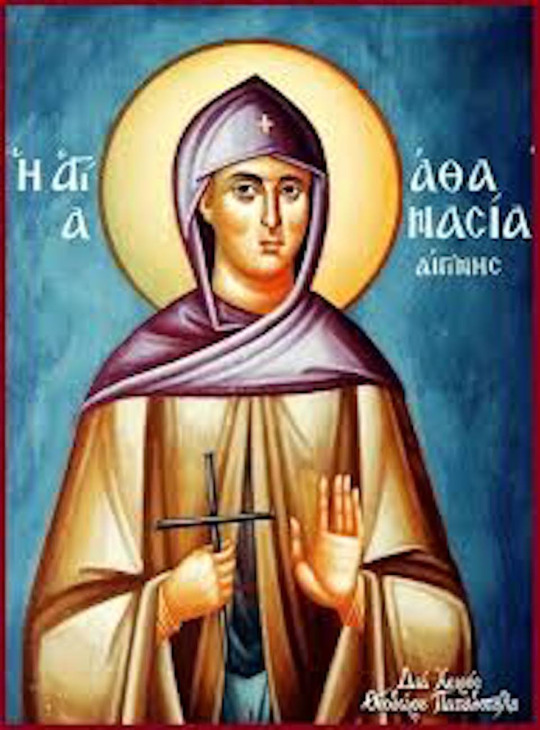
Saint Athanasia was abbess of a monastery on the island of Aegina in the ninth century. She was born into a pious Christian family, and her parents were named Nicetas and Marina. Already at seven years of age the girl studied the Psalter, which she read constantly and with feeling. Once, while working at the weaver’s loom, Saint Athanasia saw a shining star coming down to her from above, which touched her bosom and lightened all her being, and then disappeared. From that moment, the maiden was illumined in soul and she firmly resolved to enter a monastery.
When Saint Athanasia reached the age of sixteen, her parents entreated her to marry. She consented, but after sixteen days her husband was killed by barbarians who invaded Aegina.
Saint Athanasia decided to take advantage of her unexpected freedom and dedicate herself to God. Then the emperor Michael the Stammerer (820-829) issued a decree ordering all young widows and virgins to take husbands. Therefore, Saint Athanasia was forced to marry again. It is said that her second husband was a Moslem, whom she converted by her holy way of life.
She led a pious and virtuous life. She did housework, helped the sick and those in need, and took in wanderers. On Sundays and feastdays she invited family and acquaintances to her home and read the Holy Scriptures to them. Under her influence, her husband entered a monastery, and progressed in virtue and holiness. Soon, he departed to the Lord.
The saint gave away her property, became a nun, and founded a women’s monastery in a remote place. After four years, the sisters asked Saint Athanasia to become the abbess of the small community. In spite of her position, the saint surpassed all the others in meekness and humility. She asked about the infractions of the sisters with love, not anger.
Although Saint Athanasia had the title of abbess, she regarded herself as the least of the sisters and always had in mind the commandment of the Savior: “Whoever would be first among you, let him be your servant” (Mt. 20:27). The saint never permitted the sisters to wait on her, not even to pour water over her hands.
Saint Athanasia wore a hair-shirt, and over it clothes of coarse sheep’s wool. She slept very little, and prayed most of the night. By day she labored together with the sisters. On most days she ate only bread and water, and that in moderation, and only after the ninth hour of the day. She never ate cheese or fish except on Pascha and on the twelve Great Feasts. During Lent, she did not eat bread or drink water. She would only eat some vegetables every other day.
On the island of Aegina lived a certain monk named Matthew, who had been an igumen. Each night he read the whole PSALTER, and also read prayers. The saint slept sitting up and only for a short time. He could not refrain from tears when the Psalms were chanted, while reading prayers, or offering the Bloodless Sacrifice.
He wore only a coarse hair-shirt, and through his temperance and struggles his body became completely withered. He had a special love for Saint John the Theologian. Once, during the the Divine Liturgy he saw the Apostle standing by the altar table.
The saint healed a paralytic with his mantle; by making the Sign of the Cross he corrected the face of a man distorted by the actions of the devil; he cast out demons and worked many other miracles. Saint Matthew blessed Saint Athanasia to go to a more isolated place with her sisters. She built a monastery on a desolate hill of the island near an ancient church of the Protomartyr Stephen.
Saint Athanasia was granted the gift of healing by God. After she healed a man afflicted with a malady of the eyes, a crowd of people began to flock to her in order to receive healing from their infirmities of soul and body. From the abundant gifts brought to the monastery, she built three churches at the monastery: one dedicated to the Most Holy Theotokos, another to the holy Prophet John the Forerunner, and the third to Saint Nicholas the Wonderworker.
Her increasing celebrity distressed the saint, and she took the two sisters closest to her in spirit (Maria and Eupraxia) and went secretly to Constantinople. There, as a simple nun, she entered one of the women’s monasteries, where she lived for seven years.
Again, her holy life attracted attention. The sisters of the Aegina monastery learned where their abbess had gone, and they went to her imploring her to return. Submitting to the will of God, she returned to the monastery she founded. Soon after this she had a vision of two radiant men, giving her a document which said: “Here is your freedom, take it and rejoice.”
Saint Athanasia spent the twelve days before her death in unceasing prayer. On the eve of the Dormition of the Most Holy Theotokos she summoned the sisters and said that she was able to read the PSALTER only as far as the twelfth Psalm. The saint asked them to continue reading the PSALTER for her in church. The sisters went to church and there fulfilled her request, and then they came to bid the saint farewell. She blessed them and asked them to celebrate the Feast of the Dormition of the Most Holy Theotokos solemnly and joyfully, and also to provide a meal for the poor and destitute. Then, after Divine Liturgy, they could bury her body. With these words, Saint Athanasia fell asleep in the Lord on August 14, 860.
The saint predicted that she would receive glory in Heaven forty days after her death. On the fortieth day, two devout sisters were granted to see Saint Athanasia and two radiant men standing before the royal doors of the iconostasis. They clothed her with a purple robe embroidered with gold, pearls, and precious stones. They set a crown on her head, handed her a gleaming staff, and led her through the royal doors into the altar.
Before her death, Saint Athanasia ordered the nuns to feed the poor for forty days. The sisters, however, did not fulfill her request and set out the memorial meal for only ten days. The saint appeared to some of the sisters and said, “Let everyone know that alms given for a departed soul for forty days after death, and food offered to the hungry, appease God. If the departed souls are sinful, they receive forgiveness from God. If they are righteous, then the good deeds bring God’s mercy on the souls of those who perform them.”
Then she thrust her staff into the ground and became invisible. The staff left behind sprouted the next day and became a live tree. A year after the saint’s death, they led a possessed woman to the grave. When they dug up the ground, they then noticed a fragrance and removed the coffin. After she touched it, the demoniac was immediately healed. Then they opened the lid of the coffin and saw the saint’s incorrupt body, from which myrrh flowed.
Saint Athanasia looked like she was asleep. Her face shone brightly, her body was preserved incorrupt and soft, and even her hands were supple. The priests decided to place her body in church. When they transferred the body into a new coffin, the nuns removed the hair-shirt from her holy relics and wanted to dress her in silken clothes, but the hands of Saint Athanasia were so firmly clasped to her bosom, that the nuns could not dress her in the silken garb. Even in death the saint displayed her love for poverty. Then one of the sisters knelt down and began to pray to the saint, saying, “O lady, hear us as you heard us when you lived with us. Now consent to be dressed in these clothes, our humble gift to you.” Saint Athanasia, as though alive, lifted and extended her hands into the clothing.
The holy relics of Saint Athanasia were put into a crypt and became a source of healings.
The Life of Saint Athanasia is found in Vatican codex 1660, which dates from the year 916.
Saint Athanasia of Aegina is commemorated on April 12 (Slavic usage), and on April 18 (Greek usage).
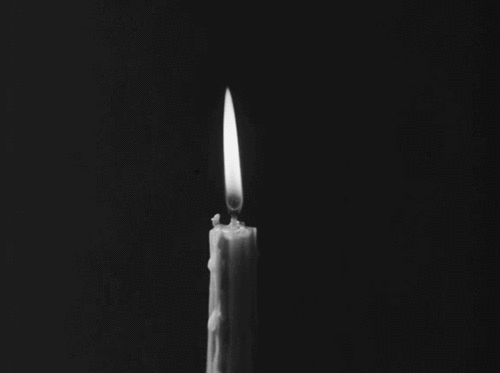
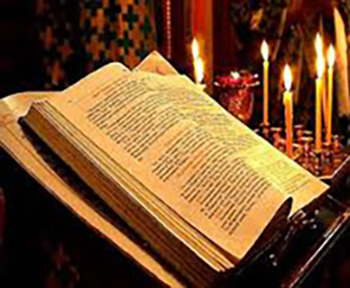
ISAIAH 65:8-16
8 Thus says the Lord: “As the new wine is found in the cluster, And one says, ‘Do not destroy it, For a blessing is in it,’ So will I do for My servants’ sake, That I may not destroy them all. 9 I will bring forth descendants from Jacob, And from Judah an heir of My mountains; My elect shall inherit it, And My servants shall dwell there. 10 Sharon shall be a fold of flocks, And the Valley of Achor a place for herds to lie down, For My people who have sought Me. 11 “But you are those who forsake the Lord, Who forget My holy mountain, Who prepare a table for Gad, And who furnish a drink offering for Meni. 12 Therefore I will number you for the sword, And you shall all bow down to the slaughter; Because, when I called, you did not answer; When I spoke, you did not hear, But did evil before My eyes, And chose that in which I do not delight.” 13 Therefore thus says the Lord God: “Behold, My servants shall eat, But you shall be hungry; Behold, My servants shall drink, But you shall be thirsty; Behold, My servants shall rejoice, But you shall be ashamed; 14 Behold, My servants shall sing for joy of heart, But you shall cry for sorrow of heart And wail for grief of spirit. 15 You shall leave your name as a curse to My chosen; For the Lord God will slay you, And call His servants by another name; 16 So that he who blesses himself in the earth Shall bless himself in the God of truth; And he who swears in the earth Shall swear by the God of truth; Because the former troubles are forgotten, And because they are hidden from My eyes.
GENESIS 46:1-7 (VESPERS, 1ST READING)
1 So Israel took his journey with all that he had, and came to Beersheba, and offered sacrifices to the God of his father Isaac. 2 Then God spoke to Israel in the visions of the night, and said, “Jacob, Jacob!” And he said, “Here I am.” 3 So He said, “I am God, the God of your father; do not fear to go down to Egypt, for I will make of you a great nation there. 4 “I will go down with you to Egypt, and I will also surely bring you up again; and Joseph will put his hand on your eyes.” 5 Then Jacob arose from Beersheba; and the sons of Israel carried their father Jacob, their little ones, and their wives, in the carts which Pharaoh had sent to carry him. 6 So they took their livestock and their goods, which they had acquired in the land of Canaan, and went to Egypt, Jacob and all his descendants with him. 7 His sons and his sons’ sons, his daughters and his sons’ daughters, and all his descendants he brought with him to Egypt.
#orthodoxy#orthodoxchristianity#easternorthodoxchurch#originofchristianity#spirituality#holyscriptures#bible#wisdom#faith#saints
1 note
·
View note
Text
Celebrated on April 12_April 25
#orthodoxy#easternorthodoxchurch#originofchristianity#icon#icons sacredart holyscriptures sacredtext gospel wisdom#sacredart#orthodoxfaith#faith
0 notes
Text
NEWS: Arrest of Metropolitan Arseny, Abbot of the Holy Dormition of the Svyatogorsk Lavra, Ukraine

On April 24, 2024, the Security Service of Ukraine (SBU) conducted a search in the Holy Dormition Svyatogorsk Lavra of the Ukrainian Orthodox Church, detained the abbot of the Lavra, Metropolitan Arseniy, and informed him that he is suspected of disseminating information about the movement or location of the Armed Forces of Ukraine, which is punishable by up to 8 years in prison. The accusation is based on the fact that in September 2023, during a sermon in the church, Vladyka allegedly told the faithful about the locations of checkpoints of the Armed Forces of Ukraine near the Lavra and thus disseminated information of a military nature.(1)
After that, Vladyka Arseny was taken by the SBU to the city of Slavyansk, and then to the city of Dnipro.
That very night, the night of April 24-25, 2024, the Oktyabrsky District Court in the city of Dnipro fully upheld the prosecutor's petition and chose a measure of restraint for Metropolitan Arseny in the form of detention for a period of 60 days. The court ignored the defense's petition for house arrest and the possibility of applying bail. At about three o'clock in the morning, Vladyka was sent immediately from the courtroom to the Dnipro pre-trial detention center.
Metropolitan Arseny suffers from serious illnesses and therefore requires constant medical supervision and treatment, which cannot be provided in the conditions of the pre-trial detention center. The arrest of Vladyka is a blatant violation of human rights and is aimed at forcibly removing Metropolitan Arseny from fulfilling the obedience of the abbot of the Svyatogorsk Lavra, which is one of the main spiritual centers of Ukraine, and isolating him.
The brethren of the Svyatogorsk Lavra prayerfully support Metropolitan Arseny, await his speedy release from arrest, and consider the accusations against Vladyka artificial and far-fetched. Despite the large-scale destruction of the monastery, with the support of Vladyka Arseny, divine services are held in the Lavra to this day, and the brethren of the monastery continue to carry out their monastic podvig every day. Also, a large number of people who lost their own homes as a result of hostilities live in the Lavra.
Metropolitan Arseny is, as it were, the heart of the Lavra, without him it is impossible to imagine the Svyatogorsk monastery. For all of us living in the Lavra, Vladyka Arseny is an indispensable spiritual mentor, administrator, and man of prayer. Therefore, the isolation of Vladyka is a heavy blow for all of us.
We thank all of you, dear brothers and sisters, for your prayers and words of support for the Holy Dormition Svyatogorsk Lavra of the Ukrainian Orthodox Church.
(1) WHAT MOTIVATED THE ARREST OF THE MOST REVEREND METROPOLITAN ARSENY?

The checkpoint Vladyka mentioned in that sermon was explicitly set up in the neighboring village to block pilgrims from coming to the celebration of the Synaxis of the Saints of the Svyatogorsk Lavra last fall. It functioned for only one or two days - for that particular purpose. Vladyka lamented that people were being prevented from coming to worship at the Lavra and from bringing the monks and refugees badly-needed humanitarian aid. Busloads of people from far away, including families with children, were held up and turned away.
15 notes
·
View notes
Text
Saints&Reading: Tuesday, April 23, 2024
april 10_april 23
THE HOLY MARTYR TERENCE and 40 OTHERS (250)
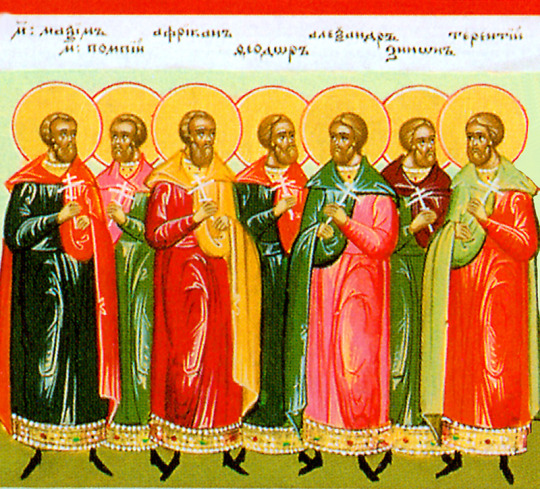
The Holy Martyr Terence and his companions suffered under the emperor Decius (249-251). The emperor issued an edict commanding all subjects to offer sacrifice to the pagan idols.
When the governor of Africa, Fortunianus, received this edict, he gathered the people into the city square, set out cruel instruments of torture, and declared that everyone, without exception, had to offer the sacrifice to the idols.
Many, afraid of torture, complied. However, Saint Terence and forty other Christians bravely affirmed their faith in the Savior and ridiculed the idols. Fortunianus was amazed at their boldness and he asked how they as rational people, could confess as God, One Whom the Jews crucified as a malefactor.
Saint Terence answered that their belief was in the Savior, Who voluntarily endured death on the Cross and rose on the third day. Fortunianus saw that Terence inspired the others by his example, and so he ordered him to be isolated in prison with his three closest companions: Africanus, Maximus, and Pompeius. Fortunianus was determined to force the rest of the martyrs, including Zeno, Alexander and Theodore, to renounce Christ.
Neither threats nor terrible tortures could sway the holy martyrs. They burned them with red-hot iron, they poured vinegar on the wounds, they sprinkled on salt, and they raked them with iron claws. In spite of their sufferings, the saints did not weaken in their confession of Christ, and the Lord gave them strength.
Fortunianus gave orders to lead the martyrs into the pagan temple, and once again he urged them to offer sacrifice to the idols. The valiant warriors of Christ cried out, “O Almighty God, Who once sent down fire on Sodom for its iniquity, destroy this impious temple of idolatry.” The idols fell down with a crash, and then the temple lay in ruins. The enraged governor gave orders to execute them, and the martyrs, glorifying God, bowed their necks beneath the executioner’s sword.
After the execution of the thirty-six martyrs, Fortunianus summoned Terence, Maximus, Africanus and Pompeius before him. He showed them the martyrs’ bodies and again urged them to offer sacrifice to the idols. The martyrs refused. The governor put heavy chains on them, and gave orders to starve them to death. By night, an angel of the Lord removed the martyrs’ chains and fed them.
In the morning, the guards found the saints cheerful and strong. Then Fortunianus ordered sorcerers and conjurers to carry snakes and all kinds of poisonous creatures into the prison. The guards looked into the cell through an opening in the ceiling and saw the martyrs unharmed, praying, and the snakes crawling at their feet. When the sorcerers opened the prison cell door, the snakes bit them. The furious Fortunianus gave orders to behead the holy martyrs. Christians took up their sacred bodies and buried them with reverence outside the city.
THE HOLY MARTYRS OF THE KVABTAKHEVI MONASTERY IN GEORGIA (386)

In the 14th century, during the reign of King Bagrat V (1360–1394), Timur (Tamerlane) invaded Georgia seven times. His troops inflicted irreparable damage on the country, seizing centuries-old treasures and razing ancient churches and monasteries.
Timur’s armies ravaged Kartli, then took the king, queen, and the entire royal court captive and sent them to Karabakh (in present-day Azerbaijan). Later Timur attempted to entice King Bagrat to renounce the Christian Faith in exchange for permission to return to the throne and for the release of the other Georgian prisoners.
For some time Timur was unable to subjugate King Bagrat, but in the end, being powerless and isolated from his kinsmen, the king began to falter. He devised a sly scheme: to confess Islam before the enemy, but to remain a Christian at heart. Satisfied with King Bagrat’s decision to “convert to Islam,” Timur permitted the king to return to the throne of Kartli. At the request of King Bagrat, Timur sent twelve thousand troops with him to complete Georgia’s forcible conversion to Islam.
When they were approaching the village of Khunani in southeastern Georgia, Bagrat secretly informed his son Giorgi of everything that had happened and called upon him and his army to massacre the invaders.
The news of Bagrat’s betrayal and the ruin of his army infuriated Timur, and he called for immediate revenge. At their leader’s command, his followers destroyed everything in their path, set fire to cities and villages, devastated churches, and thus forced their way through to Kvabtakhevi Monastery.
Monastics and laymen alike were gathered in Kvabtakhevi when the enemy came thundering in. Having forced open the gate, the attackers burst into the monastery, then plundered and seized all its treasures. They captured the young and strong, carrying them away.
The old and infirm were put to the sword. As the greatest humiliation, they mocked the clergy and monastics by strapping them with sleigh bells and jumping and dancing around them.
Already drunk on the blood they had shed, the barbarians posed an ultimatum to those who remained: to renounce Christ and live or to be driven into the church and burned alive.
Faced with these terms, the faithful cried out: “Go ahead and burn our flesh—in the Heavenly Kingdom our souls will burn with a divine flame more radiant than the sun!” And in their exceeding humility, the martyrs requested that their martyrdom not be put on display: “We ask only that you not commit this sin before the eyes of men and angels. The Lord alone knows the sincerity of our will and comforts us in our righteous afflictions!”
Having been driven like beasts into the church, the martyrs raised up a final prayer to God: “In the multitude of Thy mercy shall I go into Thy house; I shall worship toward Thy holy temple in fear of Thee. O Lord, guide me in the way of Thy righteousness; because of mine enemies, make straight my way before Thee (Ps. 5:6–7) that with a pure mind I may glorify Thee forever….”
The executioners hauled in more and more wood, until the flames enveloping the church blazed as high as the heavens and the echo of crackling timber resounded through the mountains. Ensnared in a ring of fire, the blissful martyrs chanted psalms as they gave up their spirits to the Lord.
The massacre at Kvabtakhevi took place in 1386. The imprints of the martyrs’ charred bodies remain on the floor of the church to this day.
© 2006 St. Herman of Alaska Brotherhood.


ISAIAH 49:6-10
6 Indeed He says, ‘It is too small a thing that You should be My Servant To raise up the tribes of Jacob, And to restore the preserved ones of Israel; I will also give You as a light to the Gentiles, That You should be My salvation to the ends of the earth. 7 Thus says the Lord, The Redeemer of Israel, their Holy One, To Him whom man despises, To Him whom the nation abhors, To the Servant of rulers: “Kings shall see and arise, Princes also shall worship, Because of the Lord who is faithful, The Holy One of Israel, who has chosen you." 8 Thus says the Lord: “In an acceptable time I have heard You, And in the day of salvation I have helped You; I will preserve You and give You As a covenant to the people, To restore the earth, To cause them to inherit the desolate heritages; 9 That You may say to the prisoners, ‘Go forth,’ To those who are in darkness, ‘Show yourselves.’ “They shall feed along the roads, And their pastures shall be on all desolate heights. 10 They shall neither hunger nor thirst, Neither heat nor sun shall strike them; For He who has mercy on them will lead them, Even by the springs of water He will guide them.
GENESIS 31:3-16
3 Then the Lord said to Jacob, “Return to the land of your fathers and to your family, and I will be with you.” 4 So Jacob sent and called Rachel and Leah to the field, to his flock, 5 and said to them, “I see your father’s countenance, that it is not favorable toward me as before; but the God of my father has been with me. 6 “And you know that with all my might I have served your father. 7 “Yet your father has deceived me and changed my wages ten times, but God did not allow him to hurt me. 8 “If he said thus: ‘The speckled shall be your wages,’ then all the flocks bore speckled. And if he said thus: ‘The streaked shall be your wages,’ then all the flocks bore streaked. 9 “So God has taken away the livestock of your father and given them to me. 10 “And it happened, at the time when the flocks conceived, that I lifted my eyes and saw in a dream, and behold, the rams which leaped upon the flocks were streaked, speckled, and gray-spotted. 11 “Then the Angel of God spoke to me in a dream, saying, ‘Jacob.’ And I said, ‘Here I am.’ 12 “And He said, ‘Lift your eyes now and see, all the rams which leap on the flocks are streaked, speckled, and gray-spotted; for I have seen all that Laban is doing to you. 13 ‘I am the God of Bethel, where you anointed the pillar and where you made a vow to Me. Now arise, get out of this land, and return to the land of your family.’ ” 14 Then Rachel and Leah answered and said to him, “Is there still any portion or inheritance for us in our father’s house? 15 “Are we not considered strangers by him? For he has sold us, and also completely consumed our money. 16 “For all these riches which God has taken from our father are really ours and our children’s; now then, whatever God has said to you, do it.”
#orthodoxy#orthodoxchristianity#easternorthodoxchurch#originofchristianity#spirituality#holyscriptures#bible#old testament#faith#wisdom
0 notes
Text
Let's pray for the reverend Metropolitan Arseny and for those going after him.
#orthodoxy#ukraine#hierarch#faith#prayers#forgiveness#love#orthodox christianity#monastery#archimandrite#holiness
4 notes
·
View notes
Text
Saints&Reading: Friday, April 19, 2024
april _april 19
SAINT EUTYCHIUS, PATRIARCH OF CONSTANTINOPLE. (582)

Saint Eutychius, Archbishop of Constantinople, was born in a village called “Divine” in the province of Phrygia. His father Alexander was a soldier, and his mother Synesia was the daughter of the priest Hesychius of Augustopolis. Saint Eutychius received the first rudiments of his education and a Christian upbringing from his grandfather the priest.
Once, while playing a childhood game, the boy wrote his own name with the title of Patriarch. By this he seemed to predict his future service. He was sent to Constantinople at age twelve for further education. The youth persevered in his study of science and realized that human wisdom is nothing in comparison to the study of divine Revelation. Therefore, he decided to dedicate himself to monastic life. Saint Eutychius withdrew into one of the Amasean monasteries and received the angelic schema. For his strict life he was made archimandrite of all the Amasean monasteries, and in 552 was appointed to the Patriarchal throne.
When the Fifth Ecumenical Council prepared to assemble during the reign of the holy emperor Justinian (527-565), the Metropolitan of Amasea was ill and he sent Saint Eutychius in his place. At Constantinople the aged Patriarch Saint Menas (August 25) saw Saint Eutychius and predicted that he would be the next Patriarch. After the death of the holy Patriarch Menas, the Apostle Peter appeared in a vision to the emperor Justinian and, pointing his hand at Eutychius, said, “Let him be made your bishop.”
At the very beginning of his patriarchal service, Saint Eutychius convened the Fifth Ecumenical Council (553), at which the Fathers condemned the heresies cropping up and anathematized them. However, after several years a new heresy arose in the Church: Aphthartodocetism [asartodoketai] or “imperishability” which taught that the flesh of Christ, before His death on the Cross and Resurrection, was imperishable and not capable of suffering.
Saint Eutychius vigorously denounced this heresy, but the emperor Justinian himself inclined toward it, and turned his wrath upon the saint. By order of the emperor, soldiers seized the saint in the church, removed his patriarchal vestments, and sent him into exile to an Amasean monastery (565).
The saint bore his banishment with meekness, and lived at the monastery in fasting and prayer, and he worked many miracles and healings.
Thus, through his prayer the wife of a devout man, Androgenes, who had given birth only to dead infants, now gave birth to two sons who lived to maturity. Two deaf-mutes received the gift of speech; and two grievously ill children were restored to health. The saint healed a cancerous ulcer on the hand of an artist. The saint also healed another artist, anointing his diseased hand with oil and making over it the Sign of the Cross.
The saint healed not only bodily, but also spiritual afflictions: he banished the devil out of a girl that had kept her from Holy Communion; he expelled a demon from a youth who had fled from a monastery (after which the youth returned to his monastery); he healed a drunken leper, who stopped drinking after being cleansed of his leprosy.
During the Persian invasion of Amasea and its widespread devastation, they distributed grain to the hungry from the monastery granaries on the saint’s orders, and by his prayers, the stores of grain at the monastery were not depleted.
Saint Eutychius received from God the gift of prophecy. He revealed the names of two of Emperor Justinian’s successors: Justin (565-578) and Tiberias (578-582).
After the death of the holy Patriarch John Scholastikos, Saint Eutychius returned to the cathedra in 577 after his twelve year exile, and he again wisely ruled his flock.
Four and a half years after his return to the Patriarchal throne, in 582, Saint Eutychius gathered together all his clergy on Thomas Sunday, blessed them, and peacefully fell asleep in the Lord.
VENERABLE PLATONIDA OF NISIBIS (308)

At first, Saint Platonis was a deaconess, but later, she withdrew into the Nisibian desert and founded a women’s monastery.
The Rule of her monastery was known for its strictness. The sisters partook of food only once a day. When they were not praying, they spent their time in monastic labors and various obediences.
On Friday, the day commemorating the sufferings of Christ the Savior on the Cross, all work stopped, and the nuns were in church from morning until evening. Between services they read from Holy Scripture and from commentaries.
Mother Platonis was a living example of strict monastic asceticism, meekness, and love for one's neighbor for all the sisters. After reaching a ripe old age, Venerable Platonis reposed peacefully in 308.
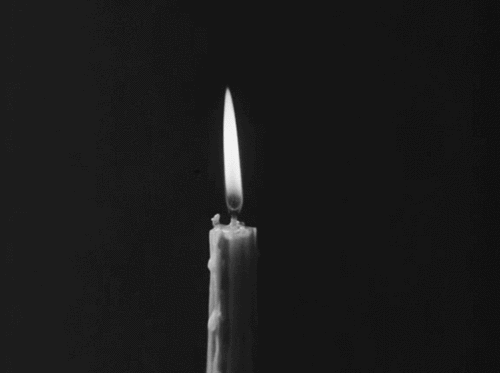
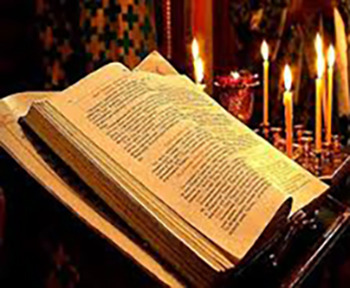
ISAIAH 45:11-17
11 Thus says the Lord, The Holy One of Israel, and his Maker: “Ask Me of things to come concerning My sons; And concerning the work of My hands, you command Me. 12 have made the earth, And created man on it. I—My hands—stretched out the heavens, And all their host I have commanded 13 I have raised him up in righteousness, And I will direct all his ways; He shall build My city And let My exiles go free, Not for price nor reward,” Says the Lord of hosts. 14 Thus says the Lord: “The labor of Egypt and merchandise of Cush And of the Sabeans, men of stature, Shall come over to you, and they shall be yours; They shall walk behind you, They shall come over in chains; And they shall bow down to you. They will make supplication to you, saying, ‘God is with you only, and there is no other; no god besides him.' 15 Truly You are God, who hide Yourself, O God of Israel, the Savior! 16 They shall be ashamed and disgraced, and all of them shall go in confusion together, wondering who the makers of idols are. 17 But Israel shall be saved by the Lord With an everlasting salvation; You shall not be ashamed or disgraced Forever and ever.
PROVERBS 17:17-18:5
17 I have perfumed my bed With myrrh, aloes, and cinnamon. 18 Come, let us take our fill of love until morning; Let us delight ourselves with love. 19 For my husband is not at home; He has gone on a long journey; 20 He has taken a bag of money with him, And will come home on the appointed day.” 21 With her enticing speech she caused him to yield, 22 Immediately he went after her, as an ox goes to the slaughter, Or as a fool to the correction of the stocks, 23 Till an arrow struck his liver. As a bird hastens to the snare, He did not know it would cost his life. 24 Now therefore, listen to me, my children; Pay attention to the words of my mouth: 25 Do not let your heart turn aside to her ways, Do not stray into her paths; 26 For she has cast down many wounded, And all who were slain by her were strong men. 27 Her house is the way to hell, Descending to the chambers of death.
1 Does not wisdom cry out, And understanding lift up her voice? 2 She takes her stand on the top of the high hill, Beside the way, where the paths meet. 3 She cries out by the gates, at the entry of the city, At the entrance of the doors: 4 To you, O men, I call, And my voice is to the sons of men. 5 O you simple ones, understand prudence, And you fools, be of an understanding heart.
#orthodoxy#orthodoxchristianity#easternorthodoxchurch#originofchristianity#spirituality#holyscriptures#bible#old testament#wisdom#saints
0 notes
Text
Saints&Reading: Thursday, April 18, 2024
april 5_april 18
VENERABLE PLATO ABBOT OF THE STUDION (813)
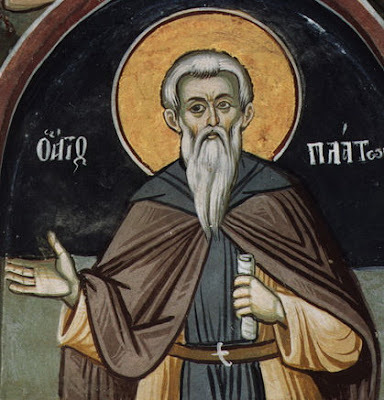
The Monk Platon (Plato) was born in the year 735 into a pious Christian family of the parents Sergios and Euphemia. Orphaned early on, the boy was taken for raising by relatives, who gave him a fine education. When he grew up he began life on his own. The saint occupied himself in the first years in managing his property, which his parents had left him upon their death. He was very temperate and hard-working and acquired great wealth from his toil. But in his heart, the monk-to-be blazed with love for Christ. He gave away all his property, freed his servants, and withdrew into a monastery called "Ensymboleion" near Mount Olympos.
His prayerful zeal, love of work, and geniality won him the love of the brethren. In his free moments from prayer, the monk copied divine service books and compiled anthologies from the works of the holy fathers. When the head of the monastery, Theoktistos, died in 770, the brethren chose the Monk Platon as hegumen despite his mere 35 years of age. After the death of the emperor Constantine Kopronymos (775), the Monk Platon set out to Constantinople. He resigned from the administration of the Nicomedia metropolitan. In 782, together with his nephews – Saints Theodore (+ 826, Comm. 11 November) and Joseph (+ 830, Comm. 26 January), he withdrew to the desolate place of Sokudion. They built a church on the Mount in honor of the holy Apostle John the Theologian and founded a monastery, the head of which became the Monk Platon. When Saint Tarasios and Empress Irene convened in Nicea in 787, the Seventh Oecumenical Council, the Monk Platon, actively participated in its work. Being learned and erudite in Holy Scripture, he successfully unmasked the error in the Iconoclast heresy and defended the veneration of holy icons. When the Monk Platon approached old age, he transferred the guidance of the monastery to the Monk Theodore.
In 795, the emperor Constantine VI (78-797) forced his spouse to accept monasticism and decided to marry one of his kinswomen, Theodosia.
Even though the holy Patriarch Tarasios condemned this marriage, one of the conspicuous Constantinople priests, Joseph, violated the Patriarch's prohibition and celebrated the emperor's marriage.
Having learned this, the Monks, Platon, and Theodore, excommunicated the emperor from the Church and dispatched a letter to all the monks. The enraged emperor gave orders to lock up Saint Platon in prison and to banish the Monk Theodore to Soluneia. Only after the emperor died in 797 did they receive their freedom. The Monk Theodore settled in Constantinople and became the hegumen of the Studite monastery. The Monk Platon lived as a simple monk at this monastery under the obedience of his nephew.
When the new emperor Nicephoros (802-811) returned to the Church on his own, the excommunicated priest Joseph, the Monks Platon, and Theodore again came forward with a denunciation of the emperor's unlawful activities. For this, the brave confessors were again punished in 807. They were imprisoned for four years. The Monk Platon was freed from imprisonment in 811 after the emperor's death and returned to the Studite monastery.
He survived three years more at work and prayer, and expired to the Lord on Lazarus Saturday at age 79, on 8 April 814. For his fearless speaking out in defense of holy icons, the Monk Platon received the title of "confessor".
Source : Church Calendar
OPTINA NEW MARTYRS SLAIN ON PASQUA (1993)

On 18 April 1993, three inhabitants of Optina Hermitage — Hieromonk Vasily (Roslyakov), Monk Trophim (Tatarinov), and Monk Therapont (Pushkaryov) — were brutally murdered by a Satanist. These three men were deemed worthy of martyrdom on Pascha. Who were these brave men, and what were they like?
We present the lives of these three saint-worthy servants of God who have yet to be canonized. It's a matter of time.
Hieromonk Vasily
Hieromonk Vasily, born Igor Ivanovich Roslyakov, was born on 23 December 1960 in Moscow. His father was a military man, and his mother was a textile weaver. From his early years, Igor excelled in swimming and eventually became the best player in the European Championship among youth water polo teams. He later graduated from the Journalism Department of Moscow State University and nurtured a devotion to writing poetry.
A chance meeting with a local translator during a competition in the Netherlands inspired Igor to start correspondence. However, during the “Cold War” era, the authorities frowned upon such interactions, who accused him of “communication with foreign citizens” and banned him from travelling abroad. Distraught, Igor sought consolation from a priest, a meeting that sparked his first visit to a church and left him inspired.
gor began to immerse himself in prayer and the writings of the holy fathers. Despite concerns from his fellow athletes that fasting might weaken him, he confidently asserted, “The main thing is to have spiritual strength,” a principle he demonstrated through his athletic performance.
In 1985, Igor celebrated Pascha for the first time. Overwhelmed with joy at the festive table with parishioners of St Nicholas Church in Moscow, he expressed a poignant wish: “It would be good to die on Easter, to the ringing of church bells.”
Learning about the revival of Optina Pustyn, Igor spent his holidays there, helping restore the monastery. This experience ignited his desire to remain there permanently. After becoming a novice, Igor was blessed to stay in the skete, a humble wooden shack once occupied by the revered 19th-century Russian elder Ambrose (Grenkov) of Optina. Initially, Igor assisted with cleaning the grounds, working in the icon shop, reading the Psalter, and keeping watch at the monastery gates.
On 29 April 1989, on Great and Holy Saturday, Igor was accepted into the monastery’s brotherhood. Reflecting on this, he wrote in his diary, “God’s mercy is granted freely, but we must offer the Lord all that we have.” On 5 January 1990, novice Igor was tonsured into monasticism, receiving the name Vasily (Basil) in honour of Saint Basil the Great.
Father Vasily often spoke humbly of himself, saying, “Although I am weak, my heart longs for the age-old monastic exploits in which our holy fathers sought salvation.”
His cell was a testament to his ascetic lifestyle: his bed was a cot covered with boards and a piece of felt, with bricks from the crypt of the Venerable elder Joseph of Optina as a pillow. Instead of a chair, he used a thick log. His bookshelf was laden with theological works by the Holy Fathers, and one wall was adorned with a reproduction of the Holy Trinity by the Venerable Andrei Rublev.
Father Vasily’s prayer life was intense; he spent hours making low earth bows in his cell at night, using his father’s old coat to muffle the sound. He adhered to a strict prayer rule, reading the Vespers with canons daily. If he missed his daily prayers, he compensated by praying at night, even while travelling. Father Vasily relished church services and served as a canonarch.
During Lent, he ate once a day, usually consuming vegetables or sour berries with a small amount of bread. Known for his humility, he always considered himself a novice, taking joy in being spiritually guided.
Father Vasily had a gentle and loving way of comforting and rejoicing in the successes of others. On 8 April 1990, Father Vasily was ordained a hierodeacon, becoming one of the monastery’s most esteemed preachers.
On Great and Holy Friday, two days before Father Vasily’s death, he experienced a profound spiritual moment during a divine service. He suddenly paused while stepping onto the solea to proclaim stichera and fell silent. At that moment, the choir sang in his stead, “Heaven at this was amazed, and the sun hid its rays.” Father Vasily remained discreet about the details of this experience.
On Holy Saturday, Father Vasily spent the entire day hearing confessions. The combination of severe fatigue, the responsibilities of the services, sleepless nights, and strict fasting (he ate nothing at all during Holy Week) took its toll on his health. Visibly pale and struggling to maintain balance, he leaned on the analogion for support. After being sprinkled with holy water by the hieromonk consecrating the Pascha cakes, he smiled, feeling somewhat relieved, and remarked, “It’s much better now,” before returning to his confessional duties.
Before the Paschal liturgy, Father Vasily was tasked with preparing the proskomidia. Ordinarily adept at this duty, he found it unusually difficult this time. Urged by the dean to hasten, he responded, “I’m sorry, I can’t. It’s so hard, as if I were cutting through my own flesh.”
At the Liturgy’s conclusion, Father Vasily served as canonarch despite his exhaustion. Noticing his weariness, a brother from the choir suggested, “Have some rest, father. We can manage on our own.”
But Father Vasily firmly replied, “I am fulfilling my obedience,” and continued with the Paschal sticheron: “May God arise, and His enemies be scattered!” He firmly believed it was better to die in obedience than to relinquish it...to be continued here

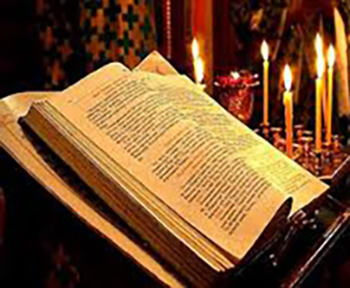
ISAIAH 42:5-16
5 Thus says God the Lord, Who created the heavens and stretched them out, Who spread forth the earth and that which comes from it, Who gives breath to the people on it, And spirit to those who walk on it: 6 “I, the Lord, have called You in righteousness, And will hold Your hand; I will keep You and give You as a covenant to the people, As a light to the Gentiles, 7 To open blind eyes, To bring out prisoners from the prison, Those who sit in darkness from the prison house. 8 I am the Lord, that is My name; And My glory I will not give to another, Nor My praise to carved images. 9 Behold, the former things have come to pass, And new things I declare; Before they spring forth I tell you of them.” 10 Sing to the Lord a new song, And His praise from the ends of the earth, You who go down to the sea, and all that is in it, You coastlands and you inhabitants of them! 11 Let the wilderness and its cities lift up their voice, The villages that Kedar inhabits. Let the inhabitants of Sela sing, Let them shout from the top of the mountains. 12 Let them give glory to the Lord, And declare His praise in the coastlands. 13 The Lord shall go forth like a mighty man and stir up His zeal like a man of war. He shall cry out, yes, shout aloud; He shall prevail against His enemies. 14 “I have held My peace a long time, I have been still and restrained Myself. Now I will cry like a woman in labor, I will pant and gasp at once. 15 I will lay waste the mountains and hills, And dry up all their vegetation; I will make the rivers coastlands, And I will dry up the pools. 16 I will bring the blind by a way they did not know; I will lead them in paths they have not known. I will make darkness light before them, And crooked places straight. These things I will do for them, And not forsake them.
GENESIS 18:20-33
20 And the Lord said, “Because the outcry against Sodom and Gomorrah is great, and because their sin is very grave, 21 “I will go down now and see whether they have done altogether according to the outcry against it that has come to Me; and if not, I will know.” 22 Then the men turned away from there and went toward Sodom, but Abraham still stood before the Lord. 23 And Abraham came near and said, “Would You also destroy the righteous with the wicked? 24 “Suppose there were fifty righteous within the city; would You also destroy the place and not spare it for the fifty righteous that were in it? 25 “Far be it from You to do such a thing as this, to slay the righteous with the wicked, so that the righteous should be as the wicked; far be it from You! Shall not the Judge of all the earth do right?” 26 So the Lord said, “If I find in Sodom fifty righteous within the city, then I will spare all the place for their sakes.” 27 Then Abraham answered and said, “Indeed now, I who am but dust and ashes have taken it upon myself to speak to the Lord: 28 “Suppose there were five less than the fifty righteous; would You destroy all of the city for lack of five?” So He said, “If I find there forty-five, I will not destroy it.” 29 And he spoke to Him yet again and said, “Suppose there should be forty found there?” So He said, “I will not do it for the sake of forty.” 30 Then he said, “Let not the Lord be angry, and I will speak: Suppose thirty should be found there?” So He said, “I will not do it if I find thirty there.” 31 And he said, “Indeed now, I have taken it upon myself to speak to the Lord: Suppose twenty should be found there?” So He said, “I will not destroy it for the sake of twenty.” 32 Then he said, “Let not the Lord be angry, and I will speak but once more: Suppose ten should be found there?” And He said, “I will not destroy it for the sake of ten.” 33 So the Lord went His way as soon as He had finished speaking with Abraham; and Abraham returned to his place.
#orthodoxy#orthodoxchristianity#easternorthodoxchurch#originofchristianity#spirituality#holyscriptures#bible#old testament#saints
1 note
·
View note
Text
Icon, Saints&Reading: Wednesday, April 17, 2024
april 4 _april 16
VIRGIN MARTYR PHERBUTA OF PERSIA, HER SISTER, AND SERVANTS (343)

The Holy Martyr Pherbutha (Phermoutha) and her sister and servants were martyred for Christ between the years 341 and 343. Saint Pherbutha and her sister were sisters of Bishop Simeon of Seleucia, who suffered for Christ under the Persian emperor Sapor between the years 341-344.
Both sisters and their servants had been brought to the court by the empress to attend her. Saint Pherbutha was distinguished by her extraordinary beauty, and the empress suggested that she marry in order to gain high position. The saint refused, since she had made a vow of virginity and total service to God.
Soon the empress fell ill. The sorcerers who were brought in to treat the empress, saw Saint Pherbutha and were struck by her extraordinary beauty. One of them asked her to become his wife. The saint answered that she was a Christian and had vowed to remain a bride of Christ.
The offended sorcerer reported to the emperor that the sickness of the empress was caused by poison given her by servants. By order of the emperor Saint Pherbutha, and her sister and servants were brought to trial.
At the trial the holy martyrs fearlessly declared that they were innocent of any crime, and that they were prepared to accept death for Christ.
The chief judge, the sorcerer Mauptis, was captivated by the beauty of the holy virgin Pherbutha, and he secretly sent his servant to her in the prison offering to free her and her companions, if only she would consent to become his wife. The two other judges secretly made similar offers to the holy virgin, one after the other.
Saint Pherbutha resolutely refused all these offers, saying that she was a bride of Christ and could never consent to an earthly marriage.
After this, the martyrs were found guilty of being Christians and of working magic in poisoning the empress, and they were sentenced to death. The pagan priests said that the bodies of the Christians should be cut into pieces. They placed three pieces on one side and three on the other. Then, they told the empress to walk between the body parts to receive healing. The bodies of the holy martyrs were thrown into a ditch, from which Christians secretly retrieved them and buried them.
ICON: THE MOTHER OF GOD GERONTISSA
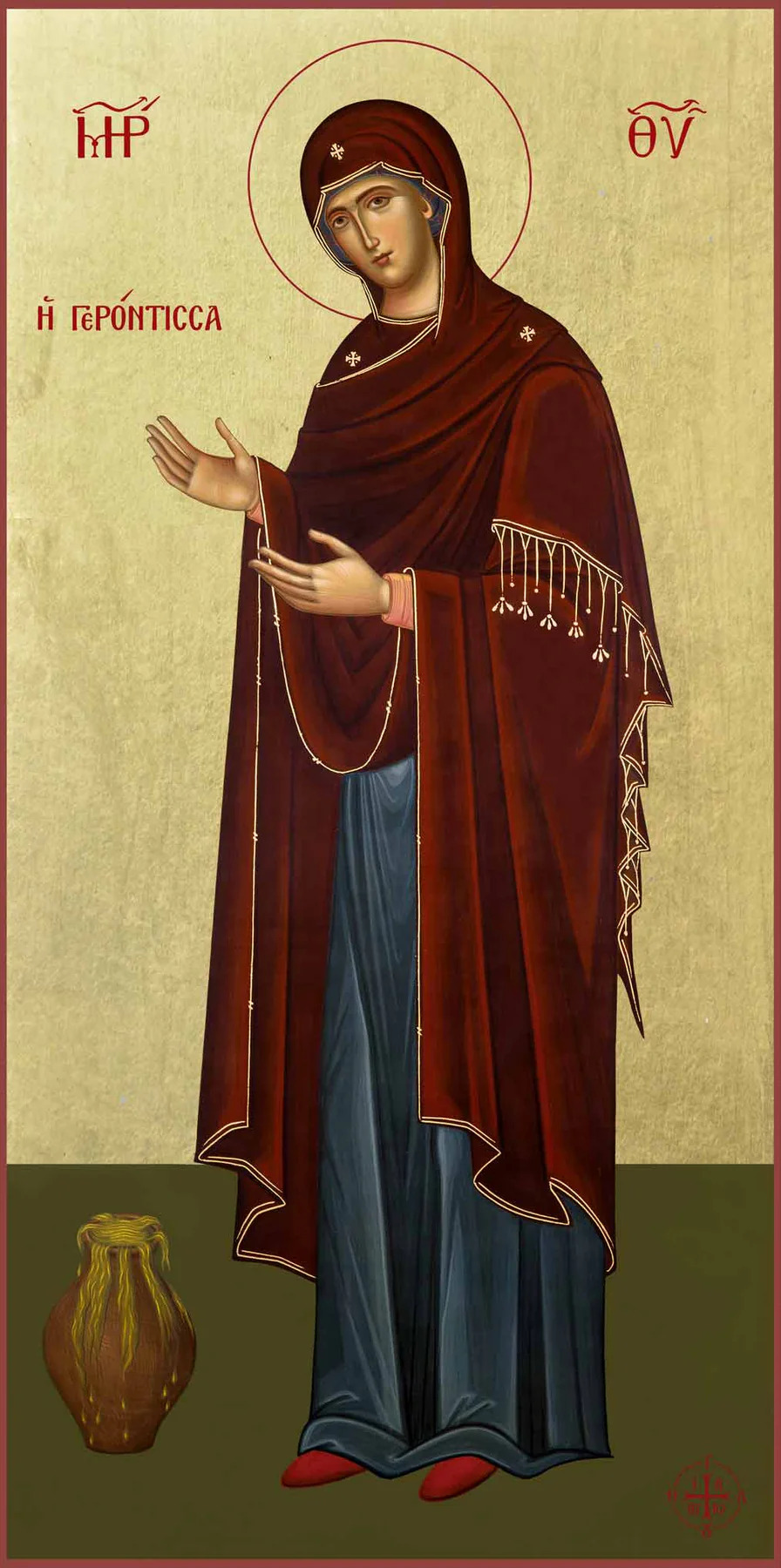
Icon from Athonite
Theotokos Gerontissa is the only Icon depicting the Virgin Mary in full stature and alone. The Icon was brought to Mount Athos from Constantinople to establish a monastery. It miraculously moved three times from its original place to its current location before the builders finally decided to leave it on the site The Theotokos had selected. Since then, countless miracles have occurred:
I. Once there lived a monk who received a revelation about his impending end. Before death, he wanted to be communed in the Holy Mysteries of Christ and he asked the serving priest to hasten the end of the Service, but the priest would not respect his request and continued to perform the Service at a slow pace. Suddenly a threatening voice coming from this icon of the Mother of God was heard, ordering the priest to do as the monk wished.
II. Another miracle occurred when, through the prayers of the monastery head, the empty oil jars were suddenly found filled with oil. In memory of the miracle, a jar was added to the icon's silver cover when refurbished.

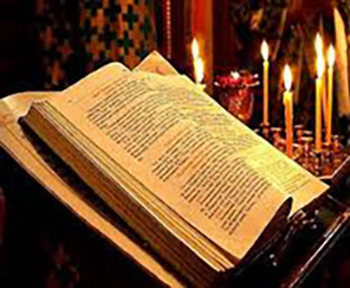
ISAIAH 41:4-14
4 Who has performed and done it, Calling the generations from the beginning? ‘I, the Lord, am the first; And with the last I am He.’ ” 5 The coastlands saw it and feared, The ends of the earth were afraid; They drew near and came. 6 Everyone helped his neighbor, And said to his brother, “Be of good courage!” 7 So the craftsman encouraged the goldsmith; He who smooths with the hammer inspired him who strikes the anvil, Saying, “It is ready for the soldering”; Then he fastened it with pegs, That it might not totter. 8 “But you, Israel, are My servant, Jacob whom I have chosen, The descendants of Abraham My friend. 9 You whom I have taken from the ends of the earth, And called from its farthest regions, And said to you, ‘You are My servant, I have chosen you and have not cast you away: 10 Fear not, for I am with you; Be not dismayed, for I am your God. I will strengthen you, Yes, I will help you, I will uphold you with My righteous right hand.’ 11 “Behold, all those who were incensed against you Shall be ashamed and disgraced; They shall be as nothing, And those who strive with you shall perish. 12 You shall seek them and not find them— Those who contended with you. Those who war against you Shall be as nothing, As a nonexistent thing. 13 For I, the Lord your God, will hold your right hand, Saying to you, ‘Fear not, I will help you.’ 14 “Fear not, you worm Jacob, You men of Israel! I will help you,” says the Lord And your Redeemer, the Holy One of Israel.
PROVERBS 15:20-16:9
20 A wise son makes a father glad, But a foolish man despises his mother. 21 Folly is joy to him who is destitute of discernment, But a man of understanding walks uprightly. 22 Without counsel, plans go awry, But in the multitude of counselors they are established. 23 A man has joy by the answer of his mouth, And a word spoken in due season, how good it is! 24 The way of life winds upward for the wise, That he may turn away from hell below. 25 The Lord will destroy the house of the proud, But He will establish the boundary of the widow. 26 The thoughts of the wicked are an abomination to the Lord, But the words of the pure are pleasant. 27 He who is greedy for gain troubles his own house, But he who hates bribes will live. 28 The heart of the righteous studies how to answer, But the mouth of the wicked pours forth evil. 29 The Lord is far from the wicked, But He hears the prayer of the righteous. 30 The light of the eyes rejoices the heart, And a good report makes the bones healthy. 31 The ear that hears the rebukes of life Will abide among the wise. 32 He who disdains instruction despises his own soul, But he who heeds rebuke gets understanding. 33 The fear of the Lord is the instruction of wisdom, And before honor is humility. 1 The preparations of the heart belong to man, But the answer of the tongue is from the Lord. 2 All the ways of a man are pure in his own eyes, But the Lord weighs the spirits. 3 Commit your works to the Lord, And your thoughts will be established. 4 The Lord has made all for Himself, 5 Everyone proud in heart is an abomination to the Lord; Though they join forces, none will go unpunished. 6 In mercy and truth Atonement is provided for iniquity; And by the fear of the Lord one departs from evil. 7 When a man’s ways please the Lord, He makes even his enemies to be at peace with him. 8 Better is a little with righteousness, Than vast revenues without justice. 9 A man’s heart plans his way, But the Lord directs his steps.
#orthodoxy#orthodoxchristianity#easternorthodoxchurch#originofchristianity#spirituality#holyscriptures#bible#old testament#wisdom#saints#icon#sacred art
3 notes
·
View notes
Text
Saints&Reading: Tuesday, April 16, 2024
april 3_april 16
VENERABLE NICETAS THE CONFESSOR ABBOT OF MEDIKION (824)

Saint Niketas (Nikḗtas) the Confessor was born in Bithynian Caesarea (northwest Asia Minor) of a pious family. His mother died eight days after his birth, and his father Philaretos became a monk. The child remained in the care of his grandmother, who raised him in a true Christian spirit. From his youth Saint Niketas attended church and was a disciple of the hermit Stephanos. With his blessing, Saint Niketas set off to the Mydicia monastery, where Saint Nikephoros (Nikēphóros) (March 13) was the igumen.
After seven years of virtuous life at the monastery, famed for its strict monastic rule, Saint Niketas was ordained presbyter. Saint Nikephoros, knowing the holy life of the young monk, entrusted to him the guidance of the monastery when he himself became ill.
Not wanting power, Saint Niketas devoted himself to the enlightenment and welfare of the monastery. He guided the brethren by his own example. Soon the fame of the lofty life of its inhabitants of the monastery attracted many seeking salvation. After several years, the number of monks had increased to one hundred.
When Saint Nikephoros departed to the Lord in his old age, the brethren unanimously chose Saint Niketas as igumen.
The Lord granted Saint Niketas the gift of wonderworking. Through his prayer a deaf-mute child received the gift of speech; two demon-possessed women were healed; he restored reason to one who had lost his mind, and many of the sick were healed of their infirmities.
During these years under the emperor Leo the Armenian (813-820), the Iconoclast heresy resurfaced and oppression increased. Orthodox bishops were deposed and banished. At Constantinople a council of heretics was convened in 815, at which they deposed the holy Patriarch Nikephoros (806-815), and in his place they chose the heretical layman Theodotus. They also installed heretics in place of exiled and imprisoned Orthodox bishops.
The emperor summoned all the heads of the monasteries and tried to bring them over to the Iconoclast heresy. Among those summoned was Saint Niketas, who stood firmly for the Orthodox confession. Following his example, all the igumens remained faithful to the veneration of holy icons. Therefore, they threw him into prison. Saint Niketas bravely underwent all the tribulations and encouraged firmness of spirit in the other prisoners.
Then the emperor and the false patriarch Theodotus attempted to trick those who remained faithful to Orthodox teaching. They promised that the emperor would give them their freedom and permit the veneration of the icons on one condition: that they take Communion from the pseudo-patriarch Theodotus.
For a long time the saint had doubts about entering into communion with a heretic, but other prisoners begged him to go along with them. Acceding to their entreaties, Saint Niketas went into the church, where icons were put out to deceive the confessors, and he accepted Communion.
But when he returned to his monastery and saw that the persecution against icons was continuing, he then repented of his deed, returned to Constantinople and fearlessly denounced the Iconoclast heresy. He ignored all the emperor’s threats.
Saint Niketas was again locked up in prison for six years until the death of the emperor Leo the Armenian. Enduring hunger and travail, Saint Niketas worked miracles by the power of his prayers: through his prayer the Phrygian ruler released two captives without ransom; three shipwrecked men for whom Saint Niketas prayed, were thrown up on shore by the waves.
Saint Niketas reposed in the Lord in 824. The saint’s body was buried at the monastery with reverence. Later, his relics became a source of healing for those coming to venerate the holy confessor.
ST. JOSEPH THE HYMNOGRAPHER, OF SICILY (883)
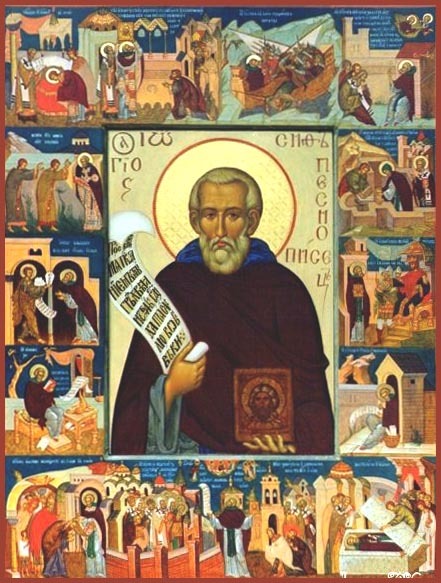
Saint Joseph the Hymnographer, “the sweet-voiced nightingale of the Church,” was born in Sicily around the turn of the 9th century into a pious Christian family. His parents, Plotinos and Agatha, moved to the Peloponnesos to save themselves from barbarian invasions. When he was fifteen, Saint Joseph went to Thessalonica and entered the monastery of Latomos. He was distinguished by his piety, his love for work, and his meekness; and he gained the good will of all the brethren of the monastery. He was later ordained as a priest.
Saint Gregory the Dekapolite (November 20) visited the monastery and took notice of the young monk, taking him along to Constantinople, where they settled together near the church of the holy Martyrs Sergius and Bacchus. This was during the reign of the emperor Leo the Armenian (813-820), a time of fierce iconoclast persecution.
Saints Gregory and Joseph fearlessly defended the veneration of holy icons. They preached in the city squares and visited in the homes of the Orthodox, encouraging them against the heretics. The Church of Constantinople was in a most grievous position. Not only the emperor, but also the patriarch were iconoclast heretics.
At that time the Roman bishops were in communion with the Eastern Church, and Pope Leo III, who was not under the dominion of the Byzantine Emperor, was able to render great help to the Orthodox. The Orthodox monks chose Saint Joseph as a steadfast and eloquent messenger to the Pope. Saint Gregory blessed him to journey to Rome and to report on the plight of the Church of Constantinople, the atrocities of the iconoclasts, and the dangers threatening Orthodoxy.
During the journey, Saint Joseph was captured by Arab brigands who had been bribed by the iconoclasts. They took him to the island of Crete, where they handed him over to the iconoclasts, who locked him up in prison. Bravely enduring all the deprivations, he encouraged the other prisoners. By his prayers, a certain Orthodox bishop who had begun to waver was strengthened in spirit and courageously accepted martyrdom.
Saint Joseph spent six years in prison. On the night of the Nativity of Christ in 820 he was granted a vision of Saint Nicholas of Myra, who told him about the death of the iconoclast Leo the Armenian, and the end of the persecution.
Saint Nicholas gave him a paper scroll and said, “Take this scroll and eat it.” On the scroll was written: “Hasten, O Gracious One, and come to our aid if possible and as You will, for You are the Merciful One.” The monk read the scroll, ate it and said, “How sweet are Thine oracles to my throat” (Ps 118/119:103). Saint Nicholas bade him to sing these words. After this the fetters fell off the saint, the doors of the prison opened, and he emerged from it. He was transported through the air and set down on a large road near Constantinople, leading into the city.
When he reached Constantinople, Saint Joseph found that Saint Gregory the Dekapolite was no longer among the living, leaving behind his disciple John (April 18), who soon died. Saint Joseph built a church dedicated to Saint Nicholas and transferred the relics of Saints Gregory and John there. A monastery was founded near the church.
Saint Joseph received a portion of the relics of the Apostle Bartholomew from a certain virtuous man. He built a church in memory of the holy apostle. He loved and honored Saint Bartholomew, and he was distressed that there was no Canon glorifying the holy Apostle. He desired to adorn the Feast of Saint Bartholomew with hymns, but he did not dare to compose them himself.
For forty days Saint Joseph prayed with tears, preparing for the Feast of the holy apostle. On the eve of the Feast the Apostle Bartholomew appeared to him in the altar. He pressed the holy Gospel to Joseph’s bosom, and blessed him to write church hymns with the words, “May the right hand of the Almighty God bless you, may your tongue pour forth waters of heavenly wisdom, may your heart be a temple of the Holy Spirit, and may your hymnody delight the entire world.” After this miraculous appearance, Saint Joseph composed a Canon to the Apostle Bartholomew, and from that time he began to compose hymns and Canons in honor of the Mother of God, of the saints, and in honor of Saint Nicholas, who liberated him from prison.
During the revival of the iconoclast heresy under the emperor Theophilus (829-842), Saint Joseph suffered a second time from the heretics. He was exiled to Cherson [Chersonessus] for eleven years. The Orthodox veneration of holy icons was restored under the holy empress Theodora (February 11) in 842, and Saint Joseph was made keeper of sacred vessels at Hagia Sophia in Constantinople. Because of his bold denunciation of the brother of the empress, Bardas, for unlawful cohabitation, the saint was again sent into exile and returned only after Bardas died in 867.
Patriarch Photius (February 6) restored him to his former position and appointed him Father-confessor for all the clergy of Constantinople.
Having reached old age, Saint Joseph fell ill. On Great and Holy Friday, the Lord informed him of his approaching demise in a dream. The saint made an inventory of the church articles in Hagia Sophia, which were under his official care, and he sent it to Patriarch Photius.
For several days he prayed intensely, preparing for death. He prayed for peace for the Church, and the mercy of God for his soul. Having received the Holy Mysteries of Christ, Saint Joseph blessed all who came to him, and with joy he fell asleep in the Lord in 886 (some sources say in 883). The choirs of the angels and the saints, whom Saint Joseph had glorified in his hymnology, carried his soul to Heaven in triumph.
In 890, his biographer John the deacon of the Great Church wrote about the spirit and power of Saint Joseph’s Canons: “When he began to write verses, then the hearing was taken with a wondrous pleasantness of sound, and the heart was struck by the power of the thought. Those who strive for a life of perfection find a respite here. Writers, having left off with their other versification, from this one treasure-trove, from the writings of Saint Joseph, began to scoop out his treasure for their own songs, or better to say, daily they scoop them out.
“And finally, all the people carry it over into their own language, so as to enlighten with song the darkness of night, or staving off sleep, to continue with the vigil until sunrise. If anyone were to peruse the life of a saint of the Church on any given day, they would see the worthiness of Saint Joseph’s hymns and acknowledge his glorious life. Actually, since the lives and deeds of almost every saint are adorned with praises, is not he worthy of immortal glory, who has worthily and exquisitely known how to glorify them?
“Now let some saints glorify his meekness, and others his wisdom, and others his works, and all together glorify the grace of the Holy Spirit, Who so abundantly and immeasurably has bestown his gifts on him.”
Most of the Canons in the MENAION are Saint Joseph’s work. His name may be found in the Ninth Ode as an acrostic. He also composed many of the hymns in the PARAKLETIKE.
Source: Orthodox Church in America_OCA
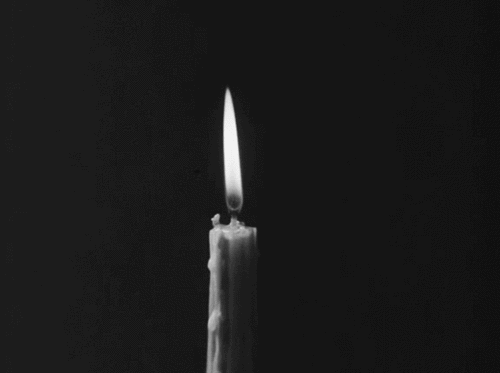
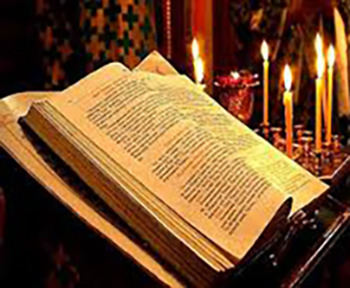
ISAIAH 40:18-31
18 To whom then will you liken God? Or what likeness will you compare to Him? 19 The workman molds an image, The goldsmith overspreads it with gold, And the silversmith casts silver chains. 20 Whoever is too impoverished for such a contribution Chooses a tree that will not rot; He seeks for himself a skillful workman To prepare a carved image that will not totter. 21 Have you not known? Have you not heard? Has it not been told to you from the beginning? Have you not understood the foundations of the earth? 22 It is He who sits above the circle of the earth, And its inhabitants are like grasshoppers, Who stretches out the heavens like a curtain, And spreads them out like a tent to dwell in. 23 He brings the princes to nothing; He makes the judges of the earth useless. 24 Scarcely shall they be planted, Scarcely shall they be sown, Scarcely shall their stock take root in the earth, When He will also blow on them, And they will wither, And the whirlwind will take them away like stubble. 25 “To whom then will you liken Me, Or to whom shall I be equal?” says the Holy One. 26 Lift up your eyes on high, And see who has created these things, Who brings out their host by number; He calls them all by name, By the greatness of His might And the strength of His power; Not one is missing. 27 Why do you say, O Jacob, And speak, O Israel: “My way is hidden from the Lord, And my just claim is passed over by my God”? 28 Have you not known? Have you not heard? The everlasting God, the Lord, The Creator of the ends of the earth, Neither faints nor is weary. His understanding is unsearchable. 29 He gives power to the weak, And to those who have no might He increases strength. 30 Even the youths shall faint and be weary, And the young men shall utterly fall, 31 But those who wait on the Lord Shall renew their strength; They shall mount up with wings like eagles, They shall run and not be weary, They shall walk and not faint.
GENESIS 15:1-15
1 After these things the word of the Lord came to Abram in a vision, saying, “Do not be afraid, Abram. I am your shield, your exceedingly great reward.” 2 But Abram said, “Lord God, what will You give me, seeing I go childless, and the heir of my house is Eliezer of Damascus?” 3 Then Abram said, “Look, You have given me no offspring; indeed one born in my house is my heir!” 4 And behold, the word of the Lord came to him, saying, “This one shall not be your heir, but one who will come from your own body shall be your heir.” 5 Then He brought him outside and said, “Look now toward heaven, and count the stars if you are able to number them.” And He said to him, “So shall your descendants be.” 6 And he believed in the Lord, and He accounted it to him for righteousness. 7 Then He said to him, “I am the Lord, who brought you out of Ur of the Chaldeans, to give you this land to inherit it.” 8 And he said, “Lord God, how shall I know that I will inherit it?” 9 So He said to him, “Bring Me a three-year-old heifer, a three-year-old female goat, a three-year-old ram, a turtledove, and a young pigeon.” 10 Then he brought all these to Him and cut them in two, down the middle, and placed each piece opposite the other; but he did not cut the birds in two. 11 And when the vultures came down on the carcasses, Abram drove them away. 12 Now when the sun was going down, a deep sleep fell upon Abram; and behold, horror and great darkness fell upon him. 13 Then He said to Abram: “Know certainly that your descendants will be strangers in a land that is not theirs, and will serve them, and they will afflict them four hundred years. 14 “And also the nation whom they serve I will judge; afterward they shall come out with great possessions. 15 “Now as for you, you shall go to your fathers in peace; you shall be buried at a good old age.
#orthodoxy#orthodoxchristianity#easternorthodoxchurch#originofchristianity#spirituality#holyscriptures#bible#oldtestament#saints
0 notes
Text
St John of Shangaï and San Francisco
Sunday, April 21, 2024
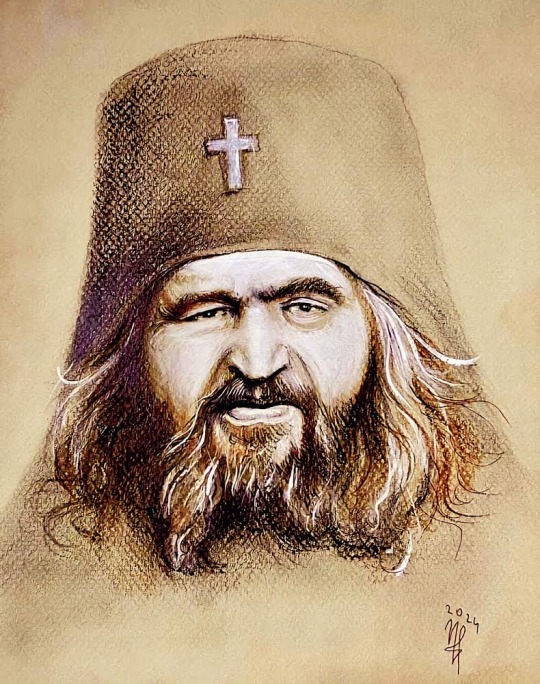
"An Aroma of Holiness" is the theme of the 13th lenten retreat of the Holy Virgin Cathedral in San Francisco. It's about St John of Shangaï and St Francisco in preparation for the 30th Anniversary of his glorification on June 29.
It will be an opportunity to discover stories, view clips, and see pictures of this internationally venerated saint of the latter days. And gather around his relics, which are preserved in the Cathedral.
If you are interested in this event, here is the place to sign up


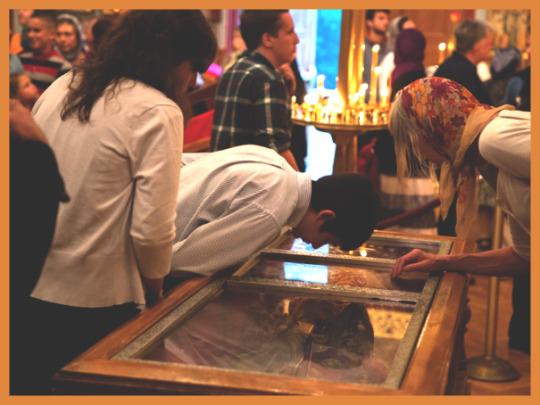
#orthodoxy#orthodoxchristianity#lent#saint#stjohnofshangaiandsanfrancisco#stjohnmaximovitch#holiness
0 notes
Text
Saints&Reading: Sunday, April 14, 2024
april 1_april 14
VENERABLE BARSANUPHIUS OF OPTINA (1913)

Paul I. Plikhanov was born in the city of Samara on July 5,1845, the son of John and Natalia Plikhanov. His mother died in childbirth, and his father later remarried so that his son would have a mother. Although his stepmother was very strict, she was a real mother to him, and he loved her very much.
As a descendant of the Orenburg Cossacks, Paul was enrolled in the Polotsk Cadet Corps. He completed his studies at the Orenburg Military School and received an officer’s commission. He later graduated from the Petersburg Cossack Staff Officers’ School, and also served at the headquarters of the Kazan military district and eventually rose to the rank of colonel.
Once, as he was sick with pneumonia, Paul sensed that he was about to die. He asked his orderly to read the Gospel to him, and passed out. Then he had a vision in which the heavens seemed to open, and he was afraid because of the great light. His whole sinful life passed before him, and he was overcome with repentance. A voice told him he should go to Optina Monastery, but the doctors did not think he would recover. His health did improve, however, and the colonel visited Optina. In August 1889 the Elder of the Monastery was Saint Ambrose (October 10), who told Paul to set his worldly affairs in order. Two years later, Saint Ambrose blessed him to cut all ties to the world and told him to enter Optina within three months.
It was not easy for the colonel to resign his commission within the specified three month period, because obstacles were placed in his way. In fact, he was offered a promotion to the rank of general, and was asked to delay his retirement. Some people even tried to arrange a marriage for him, laughing at his intention to go to the monastery. Only his stepmother was happy that he wished to become a monk. On the very last day of the three months he concluded his affairs and arrived at Optina. However, Saint Ambrose was already laid out in his coffin in the church.
Saint Anatole I (January 25) succeeded Father Ambrose as Elder, and he assigned Paul to Hieromonk Nectarius (April 29) as his cell attendant. He was accepted as a novice in 1892, and tonsured as a rassophore in 1893. Over the next ten years he advanced through the various stages of monastic life, including ordination as deacon (1902), and as priest (1903). The monk Paul was secretly tonsured into the mantiya in December of 1900 because of a serious illness. When they asked him what name he wished to receive, he said it did not matter. They named him in honor of Saint Barsanuphius of Tver and Kazan (April 11). Although he recovered, they did not give him the mantiya until December of 1902 after the Liturgy when it was revealed that he had been tonsured on his sickbed.
On September 1, 1903 Father Barsanuphius was appointed to assist Elder Joseph, the skete Superior, in the spiritual direction of the skete brethren and the sisters of the Shamordino convent.
At the beginning of the Russo-Japanese war in 1904, Father Barsanuphius was sent to the Far East as a military chaplain, where he ministered to wounded soldiers. The war ended in August 1905, and Saint Barsanuphius returned to Optina on November 1, 1905.
Since Elder Joseph had become too old and frail to administer the skete’s affairs, Father Barsanuphius was appointed as Superior of the skete in his place. Father Barsanuphius soon reestablished order and discipline, paid off debts, repaired buildings, etc. As Superior, he combined strictness with paternal concern and tenderness for those under him.
Saint Barsanuphius, like the other Elders of Optina, possessed the gifts of clairvoyance and of healing people afflicted with physical and spiritual ailments. One of his spiritual sons, Father Innocent Pavlov, recalled his first Confession with the Elder. He became fearful because Father Barsanuphius seemed to know his innermost thoughts, reminding him of people and events which he had forgotten. The saint spoke gently and told him that it was God who had revealed to him these things about Father Innocent. “During my lifetime, do not tell anyone about what you are experiencing now,” he said, “but you may speak of it after my death.”
Saint Barsanuphius loved spiritual books, especially the Lives of the Saints. He often told people that those who read these Lives with faith benefit greatly from doing so. The answers to many of life’s questions can be found by reading the Lives of the Saints, he said. They teach us how to overcome obstacles and difficulties, how to stand firm in our faith, and how to struggle against evil and emerge victorious. Although the Lives of the Saints were widely available, it saddened the Elder that more people did not read them.
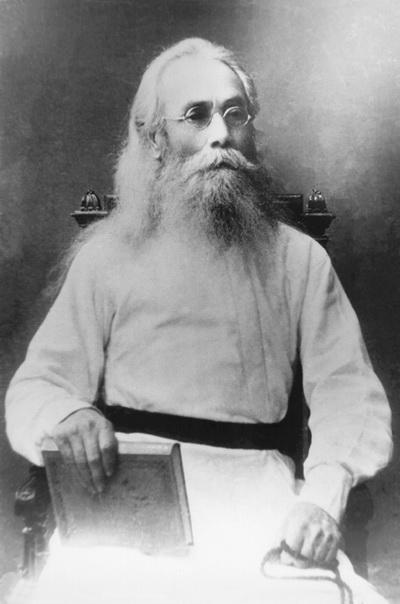
Saint Barsanuphius commemorated many saints each day during his Rule of prayer, and this was not accidental. Each saint, he once explained, had some particular importance in his life. If, for example, some significant event took place, he would look to see which saints were commemorated on that day, then he would begin to commemorate them each day. Later he noticed that on their Feast Day, they would often deliver him from some danger or trouble. On December 17, 1891, the commemoration of the Prophet Daniel and the three holy youths, he left Kazan and never returned. That was the day he decided to leave the world, and Saint Barsanuphius felt that God had delivered him from a furnace of passions. Just as the three youths were delivered from the fiery furnace because they would not bow down before idols, the Elder always believed that he left the world unharmed because he refused to bow down before the idols of lust, pride, gluttony, etc.
By 1908, Saint Barsanuphius seemed to fall ill more frequently, and began to speak of his approaching death. In April of that year, someone sent him a package containing the Great Schema. Father Barsanuphius had long desired to be tonsured into the Great Schema before his death, but he had told no one of this except for the archimandrite. Therefore, he regarded this as a sign that he would soon die.
One night in July 1910, the Elder became so ill that he had to leave church during Vigil and return to his cell. The next morning, July 11, he was so weak that he could not sit up by himself. That evening he was tonsured into the Great Schema.
Father Barsanuphius began to recover, but there were new problems in the monastery. New monks came in from spiritually lax environments. They did not understand the ascetical nature of monasticism or the whole notion of eldership, and so they began to clamor for reform and change. They wanted to assume positions of authority, and to close the skete. Because of their complaints, Father Barsanuphius was removed from Optina and assigned as igumen of the Golutvinsky Monastery. When he arrived to take up his duties, Father Barsanuphius found the monastery in a state of physical and spiritual decline. Nevertheless, he did not lose heart, and soon the monastery began to revive. More people began to visit, once they heard that an Optina Elder had come to Goluvinsky, and the monastery’s financial position also began to improve. However, the rebellious brethren caused him great sorrow, and he had to expel some of them
At the beginning of 1913, Saint Barsanuphius became ill again and asked Metropolitan Macarius of Moscow for permission to retire to Optina, but that was not to be. He fell asleep in the Lord on April 1, and his body remained in the church of Golotvino until April 6 (which was also Lazarus Saturday). After the funeral, his body was placed on a train and sent to Optina for burial. The train arrived at Kozelsk Station on April 8, and the coffin was carried to Optina by clergy.
The Moscow Patriarchate authorized local veneration of the Optina Elders on June 13, 1996. The work of uncovering the relics of Saints Leonid, Macarius, Hilarion, Ambrose, Anatole I, Barsanuphius and Anatole II began on June 24/July 7, 1998 and was concluded the next day. However, because of the church Feasts (Nativity of Saint John the Baptist, etc.) associated with the actual dates of the uncovering of the relics, Patriarch Alexey II designated June 27/July 10 as the date for commemorating this event. The relics of the holy Elders now rest in the new church of the Vladimir Icon of the Mother of God.
The Optina Elders were glorified by the Moscow Patriarchate for universal veneration on August 7, 2000.
VENERABLE GERONTIUS, YOUTH, CANONARCH OF THE KIEV CAVE (14th.c.)
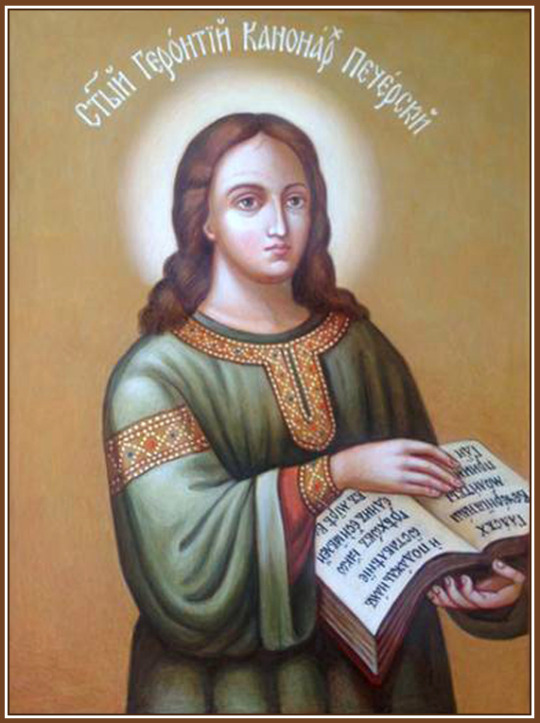
Saint Gerontius lived during the fourteenth century. He was a monk of the Kiev Caves Monastery and fulfilled the obedience of canonarch (leader of church singing). He spent all his life at the monastery, in ascetic deeds of abstinence, obedience, and prayer.
Saint Gerontius was buried in the Far Caves. His memory is celebrated also together with the Synaxis of the Saints of the Far Caves, on August 28.

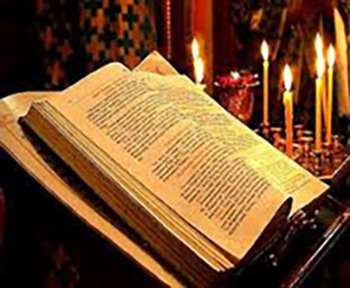
EPHESIANS 5:9-19
9 (for the fruit of the Spirit is in all goodness, righteousness, and truth), 10 finding out what is acceptable to the Lord. 11 And have no fellowship with the unfruitful works of darkness, but rather expose them. 12 For it is shameful even to speak of those things which are done by them in secret. 13 But all things that are exposed are made manifest by the light, for whatever makes manifest is light. 14 Therefore He says: "Awake, you who sleep, Arise from the dead, And Christ will give you light." 15 See then that you walk circumspectly, not as fools but as wise, 16 redeeming the time, because the days are evil. 17 Therefore do not be unwise, but understand what the will of the Lord is. 18 And do not be drunk with wine, in which is dissipation; but be filled with the Spirit, 19 speaking to one another in psalms and hymns and spiritual songs, singing and making melody in your heart to the Lord,
MARK 9:17-31
17 Then one of the crowd answered and said, "Teacher, I brought You my son, who has a mute spirit. 18 And wherever it seizes him, it throws him down; he foams at the mouth, gnashes his teeth, and becomes rigid. So I spoke to Your disciples, that they should cast it out, but they could not. 19 He answered him and said, "O faithless generation, how long shall I be with you? How long shall I bear with you? Bring him to Me." 20 Then they brought him to Him. And when he saw Him, immediately the spirit convulsed him, and he fell on the ground and wallowed, foaming at the mouth. 21 So He asked his father, "How long has this been happening to him?" And he said, "From childhood. 22 And often he has thrown him both into the fire and into the water to destroy him. But if You can do anything, have compassion on us and help us. 23 Jesus said to him, "If you can believe, all things are possible to him who believes." 24 Immediately the father of the child cried out and said with tears, "Lord, I believe; help my unbelief!" 25 When Jesus saw that the people came running together, He rebuked the unclean spirit, saying to it: "Deaf and dumb spirit, I command you, come out of him and enter him no more!" 26 Then the spirit cried out, convulsed him greatly, and came out of him. And he became as one dead, so that many said, "He is dead." 27 But Jesus took him by the hand and lifted him up, and he arose. 28 And when He had come into the house, His disciples asked Him privately, "Why could we not cast it out?" 29 So He said to them, "This kind can come out by nothing but prayer and fasting." 30 Then they departed from there and passed through Galilee, and He did not want anyone to know it. 31 For He taught His disciples and said to them, "The Son of Man is being betrayed into the hands of men, and they will kill Him. And after He is killed, He will rise the third day."
#orthodoxy#orthodoxchristianity#easternorthodoxchurch#originofchristianity#holyscriptures#gospel#wisdom#spirituality#saints
5 notes
·
View notes
Text
Saints&Reading: Saturday, April 13, 2024
march 31_april 13
SAINT INNOCENT OF MOSCOW, ENLIGHTNER OF ALASKA ANS SIBERIA (1879)
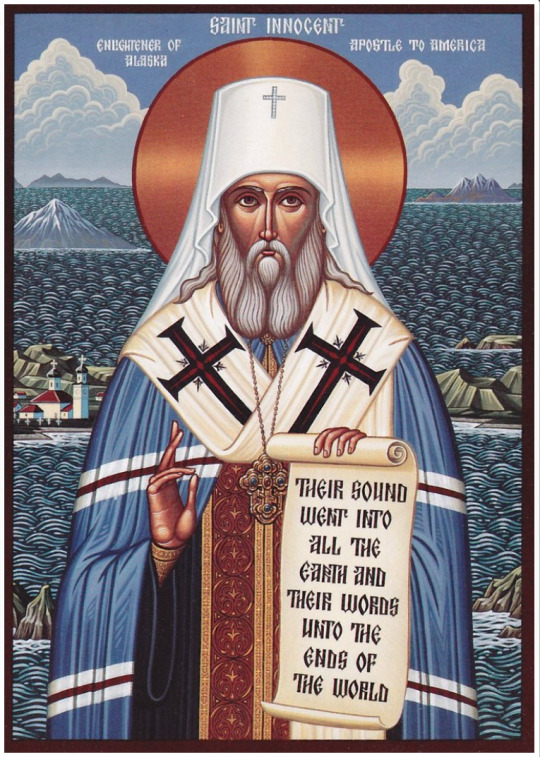
Icon written by hieroscemamonk Ephrem.
Our father among the saints Innocent of Alaska, Equal-to-the-Apostles and Enlightener of North America (1797-1879), was a Russian Orthodox priest, bishop, archbishop, and Metropolitan of Moscow and all Russia. He is known for his missionary work, scholarship, and leadership in Alaska and the Russian Far East during the 1800s. He is known for his great zeal for his work as well as his great abilities as a scholar, linguist, and administrator. He was a missionary, later a bishop and archbishop in Alaska and the Russian Far East. He learned several native languages and was the author of many of the earliest scholarly works about the natives and their languages, as well as dictionaries and religious works in these languages. He also translated parts of the Bible into several native languages.
St. Innocent, né Ivan (John) Evseyevich Popov-Veniaminov, was born on August 26, 1797, into the family of a church server in the village of Anginskoye, Verkholensk District, Irkutsk province, in Russia. His father died when John was six.
In 1807, John entered the Irkutsk Theological Seminary. In 1817 he married, and on May 18, 1817 he was ordained deacon of the Church of the Annunciation in Irkutsk. He completed his studies in 1818. He was appointed a teacher in a parish school, and on May 18, 1821 he was ordained priest to serve in the Church of the Annunciation.
At the beginning of 1823, Bishop Michael of Irkutsk received instructions to send a priest to the island of Unalaska in the Aleutian Islands of Alaska. Father John Veniaminov volunteered to go, and on May 7, 1823, he departed from Irkutsk, accompanied by his aging mother, his wife, his infant son Innocent, and his brother Stefan. After a difficult one-year journey, they arrived at Unalaska on July 29, 1824.
After John and his family built and moved into an earthen hut, he undertook the construction of a church on the island and set about studying the local languages and dialects. He trained some of his parishioners in construction techniques and with them undertook the construction of a church, which was finished the following July.
Father John's parish included the island of Unalaska and the neighboring Fox Islands and Pribilof Islands, whose inhabitants had been converted to Christianity before his arrival, but retained many of their pagan ways and customs. Father John often traveled between the islands in a canoe, battling the stormy Gulf of Alaska.
His travels over the islands greatly enhanced Father John Veniaminov's familiarity with the local dialects. In a short time he mastered six of the dialects. He devised an alphabet of Cyrillic letters for the most widespread dialect, the Unagan dialect of Aleut and, in 1828, translated the Holy Gospel of St. Matthew and other church materials into that dialect, which were eventually published in 1840 with the blessing of the Holy Synod of the Russian Orthodox Church. In 1829, he journeyed to the Bering Sea coast of the Alaskan mainland and preached to the people there. In 1836, his travels even extended to the south, to the Ross Colony north of San Francisco and to the Spanish missions of northern California. At Ross Colony he conducted services at its small, wooden chapel.
In 1834, Father John was transferred to Sitka Island, to the town of Novoarkhangelsk, later called Sitka. He devoted himself the Tlingit people and studied their language and customs. His studies there produced the scholarly works Notes on the Kolushchan and Kodiak Tongues and Other Dialects of the Russo-American Territories, with a Russian-Kolushchan Glossary.
In 1838, Father John journeyed to St. Petersburg and Moscow, Russia, and Kiev, Ukraine, to report on his activities and request an expansion of the Church's activities in Russian America. While he was there, he received notice that his wife had died. He requested permission to return to Sitka. Instead, it was suggested that he take vows as a monk. Father John at first ignored these suggestions, but, on November 29, 1840, made his vows. He chose the name Innocent in honor of Bishop Innocent of Irkutsk.
On December 15, 1840, Archimandrite Innocent Veniaminov was consecrated Bishop of Kamchatka and Kuril Islands in Russia and the Aleutian Islands in Russian America. His see was located in Novoarkhangelsk, which he returned to in September 1841. He spent the next nine years in the administration of his see as well as on several long missionary journeys to its remote areas. On April 21, 1850, Bishop lnnocent was elevated to Archbishop. In 1852, the Yakut area was admitted to the Kamchatka Diocese, and in September 1853, Archbishop Innocent took up permanent residence in the town of Yakutsk. Innocent took frequent trips throughout his enlarged diocese. He devoted much energy to the translation of the scriptures and service books into the Yakut (Sakha) language.
In April 1865, Archbishop Innocent was appointed a member of the Holy Governing Synod of the Church.
On November 19, 1867, he was appointed the Metropolitan of Moscow, replacing his friend and mentor, Filaret, who had died. While there, he undertook revisions of many Church texts that contained errors, raised funds to improve the living conditions of priests and established a retirement home for priests.
Innocent died on March 31, 1879. He was buried on April 5, 1879, at Troitse-Sergiyeva Lavra.
Source: St Innocent Church
VENERABLE HYPATIUS, MONK HEALER OF THE KIEV CAVE (14th.c.)

Saint Hypatius the Healer of the Caves, attained glory through his severe fasting and prayerful vigilance. By night he stood at prayer, slept very little, and ate only bread and water.
Saint Hypatius devoted himself entirely to the service of the sick, and received from God the gift of healing. Those sick with various illnesses often hastened to his prayerful intercession.
The memory of Saint Hypatius is celebrated also on August 28, on the Synaxis of the Saints of the Far Caves.


1 CORINTHIANS 15:47-57
47 The first man was of the earth, made of dust; the second Man is the Lord from heaven. 48 As was the man of dust, so also are those who are made of dust; and as is the heavenly Man, so also are those who are heavenly. 49 And as we have borne the image of the man of dust, we shall also bear the image of the heavenly Man. 50 Now this I say, brethren, that flesh and blood cannot inherit the kingdom of God; nor does corruption inherit incorruption. 51 Behold, I tell you a mystery: We shall not all sleep, but we shall all be changed- 52 in a moment, in the twinkling of an eye, at the last trumpet. For the trumpet will sound, and the dead will be raised incorruptible, and we shall be changed. 53 For this corruptible must put on incorruption, and this mortal must put on immortality. 54 So when this corruptible has put on incorruption, and this mortal has put on immortality, then shall be brought to pass the saying that is written: "Death is swallowed up in victory."55 O Death, where is your sting? O Hell, where is your victory? 56 The sting of death is sin, and the strength of sin is the law. 57 But thanks be to God, who gives us the victory through our Lord Jesus Christ.
MARK 7:31-37
31 Again, departing from the region of Tyre and Sidon, He came through the midst of the region of Decapolis to the Sea of Galilee. 32 Then they brought to Him one who was deaf and had an impediment in his speech, and they begged Him to put His hand on him. 33 And He took him aside from the multitude, and put His fingers in his ears, and He spat and touched his tongue. 34 Then, looking up to heaven, He sighed, and said to him, "Ephphatha," that is, "Be opened." 35 Immediately his ears were opened, and the impediment of his tongue was loosed, and he spoke plainly. 36 Then He commanded them that they should tell no one; but the more He commanded them, the more widely they proclaimed it. 37 And they were astonished beyond measure, saying, "He has done all things well. He makes both the deaf to hear and the mute to speak."
#orthodoxy#orthodoxchristianity#easternorthodoxchurch#originofchristianity#spirituality#holyscriptures#gospel#wisdom#saints
6 notes
·
View notes
Text
Saints&Reading: Friday, April 12, 2024
march 30 _april 12
Visitation of the Mother of God and Saint Elizabeth
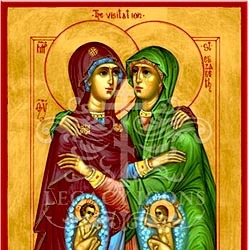
Archimandrite Antonin Kapustin (1894-), head of the Russian Orthodox Mission in Jerusalem, established this feast and composed the service.
The Gorneye Convent in Jerusalem, built on the site of the Meeting of the Theotokos and Saint Elizabeth, celebrates this Feast on March 30. If March 30 should fall between Lazarus Saturday and Pascha, however, the Feast is transferred to Bright Friday.
VENERABLE JOHN CLIMATICUS OF SINAI, MONK AUTHOR OF THE LADDER (649)

Saint John of the Ladder is honored by Holy Church as a great ascetic and author of the renowned spiritual book called THE LADDER, from which he is also called “of the Ladder” (Climacus).
There is almost no information about Saint John’s origins. One tradition suggests that he was born in Constantinople around the year 570, and was the son of Saints Xenophon and Maria (January 26).
John went to Sinai when he was sixteen, submitting to Abba Martyrius as his instructor and guide. After four years, Saint John was tonsured as a monk. Abba Strategios, who was present at Saint John’s tonsure, predicted that he would become a great luminary in the Church of Christ.
For nineteen years Saint John progressed in monasticism in obedience to his spiritual Father. After the death of Abba Martyrius, Saint John embarked on a solitary life, settling in a wild place called Thola, where he spent forty years laboring in silence, fasting, prayer, and tears of penitence.
It is not by chance that in THE LADDER Saint John speaks about tears of repentance: “Just as fire burns and destroys the wood, so pure tears wash away every impurity, both external and internal.” His holy prayer was strong and efficacious, as may be seen from an example from the life of the God-pleasing saint.
Saint John had a disciple named Moses. Once, the saint ordered his disciple to bring dung to fertilize the vegetable garden. When he had fulfilled the obedience, Moses lay down to rest under the shade of a large rock, because of the scorching heat of summer. Saint John was in his cell in a light sleep. Suddenly, a man of remarkable appearance appeared to him and awakened the holy ascetic, reproaching him, “John, why do you sleep so heedlessly, when Moses is in danger?”
Saint John immediately woke up and began to pray for his disciple. When Moses returned in the evening, Saint John asked whether any sort of misfortune had befallen him.
The monk replied, “A large rock would have fallen on me as I slept beneath it at noon, but I left that place because I thought I heard you calling me.” Saint John did not tell his disciple of his vision, but gave thanks to God.
Saint John ate the food which is permitted by the monastic rule, but only in moderation. He did not sleep very much, only enough to keep up his strength, so that he would not ruin his mind by unceasing vigil. “I do not fast excessively,” he said of himself, “nor do I give myself over to intense all-night vigil, nor lay upon the ground, but I restrain myself..., and the Lord soon saved me.”
The following example of Saint John’s humility is noteworthy. Gifted with discernment, and attaining wisdom through spiritual experience, he lovingly received all who came to him and guided them to salvation. One day some envious monks reproached him for being too talkative, and so Saint John kept silence for a whole year. The monks realized their error, and they went to the ascetic and begged him not to deprive them of the spiritual profit of his conversation.
Concealing his ascetic deeds from others, Saint John sometimes withdrew into a cave, but reports of his holiness spread far beyond the vicinity. Visitors from all walks of life came to him, desiring to hear his words of edification and salvation. After forty years of solitary asceticism, he was chosen as igumen of Sinai when he was seventy-five. Saint John governed the holy monastery for four years. Toward the end of his life, the Lord granted him the gifts of clairvoyance and wonderworking.
At the request of Saint John, igumen of the Raithu monastery (Commemorated on Cheesefare Saturday), he wrote the incomparable LADDER, a book of instruction for monks who wished to attain spiritual perfection.
Knowing of the wisdom and spiritual gifts of Saint John of Sinai, the igumen of Raithu requested him to write down whatever was necessary for the salvation of those in the monastic life. Such a book would be “a ladder fixed on the earth” (Gen. 28:12), leading people to the gates of Heaven.
Saint John felt that such a task was beyond his ability, yet out of obedience he fulfilled the request. The saint called his work THE LADDER, for the book is “a fixed ladder leading from earthly things to the Holy of Holies....” The thirty steps of spiritual perfection correspond to the thirty years of the Lord’s age. When we have completed these thirty steps, we will find ourselves with the righteous and will not stumble. THE LADDER begins with renunciation of the world, and ends with God, Who is love (1 John 4:8).
Although the book was written for monks, any Christian living in the world will find it an unerring guide for ascending to God, and a support in the spiritual life. Saints Theodore the Studite (November 11 and January 26), Sergius of Radonezh (September 25 and July 5), Joseph of Volokolamsk (September 9 and October 18), and others relied on THE LADDER as an important guide to salvation.
The twenty-second step of THE LADDER deals with various forms of vainglory. Saint John writes: “When I fast, I am vainglorious; and when I permit myself food in order to conceal my fasting from others I am again vainglorious about my prudence. When I dress in fine clothing, I am vanquished by vanity, and if I put on drab clothing, again I am overcome by vanity. If I speak, vainglory defeats me. If I wish to keep silence, I am again given over to it. Wherever this thorn comes up, it stands with its points upright.
A vain person seems to honor God, but strives to please men rather than God.
People of lofty spirit bear insult placidly and willingly, but only the holy and righteous may hear praise without harm.
When you hear that your neighbor or friend has slandered you behind your back, or even to your face, praise and love him.
It is not the one who reproaches himself who shows humility, for who will not put up with himself? It is the one who is slandered by another, yet continues to show love for him.
Whoever is proud of his natural gifts, intelligence, learning, skill in reading, clear enunciation, and other similar qualities, which are acquired without much labor, will never obtain supernatural gifts. Whoever is not faithful in small things (Luke 16:10), is also unfaithful in large things, and is vainglorous.
It often happens that God humbles the vainglorious, sending a sudden misfortune. If prayer does not destroy a proud thought, we bring to mind the departure of the soul from this life. And if this does not help, let us fear the shame which follows dishonor. “For whoever humbles himself shall be exalted, and whoever exalts himself shall be humbled” (Luke 14:11). When those who praise us, or rather seduce us, start to praise us, let us recall our many sins, then we shall find that we are not worthy of what they say or do to honor us.”
In THE LADDER Saint John describes the ascent toward spiritual perfection, which is essential for anyone who wishes to save his soul. It is a written account of his thoughts, based on the collected wisdom of many wise ascetics, and on his own spiritual experience. The book is a great help on the path to truth and virtue.
The steps of THE LADDER proceed gradually from strength to strength on the path of perfection. The summit is not reached suddenly but gradually, as the Savior says: “The Kingdom of Heaven suffers violence, and the violent take it by force” (Mt.11:12).
SAINT SOPHRONII, BISHOP OF IRKUTSK AND WONDERWORKER OF ALL SIBERIA (1771)
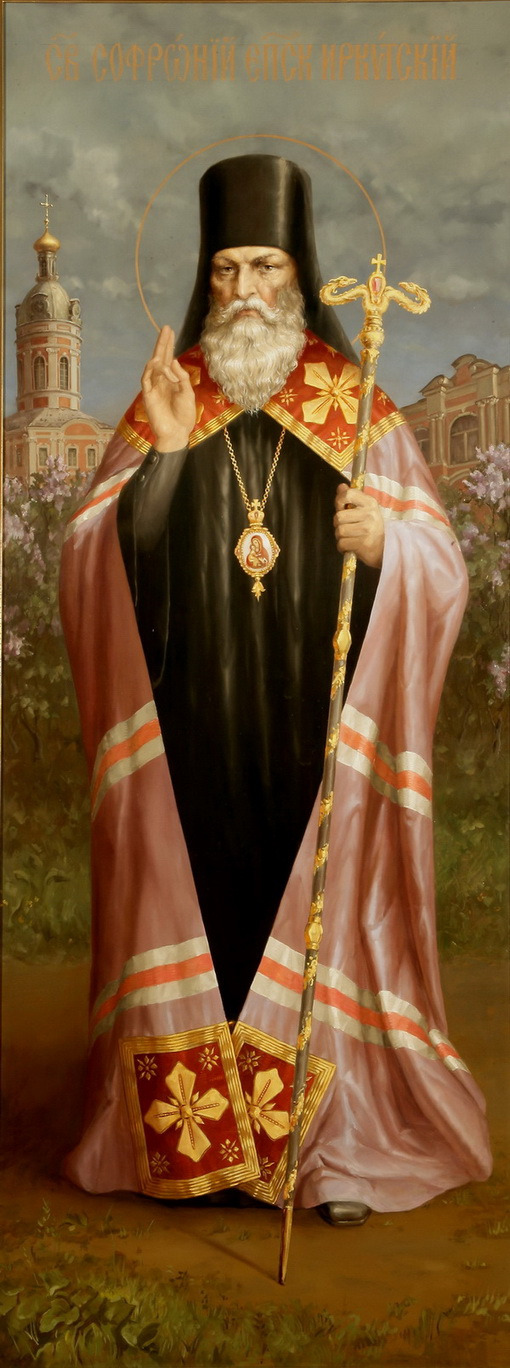
Saint Sophronius, Bishop of Irkutsk and Wonderworker of all Siberia, whose family name was Kristalevsky, was born in Malorussia in the Chernigov region in 1704. His father, Nazarius, was “a common man in his affairs,” the saint was named Stephen, in honor of the protomartyr Saint Stephen. He had two brothers and a sister, Pelagia. The name of one brother was Paul. The name of the other older brother is unknown, but it is said that he was head of the Krasnogorsk Zolotonosh monastery.
Stephen’s childhood years were spent in the settlement of Berezan in the Pereyaslavl district of the Poltava governance, where the family settled after the father was discharged from service. When he came of age, Stephen entered the Kiev Theological Academy, where two other future hierarchs were studying: Joasaph, future Bishop of Belgorod (September 4 and December 10), and Paul, future Metropolitan of Tobolsk (June 10 and November 4).
After completing his religious education, Stephen entered the Krasnogorsk Transfiguration monastery [later renamed the Protection monastery. In 1789, it was transformed into a women’s monastery], where his elder brother already labored in asceticism. On April 23, 1730 he received monastic tonsure with the name of Sophronius, in honor of Saint Sophronius of Jerusalem (March 11).
On the night after his monastic tonsure, Saint Sophronius heard a Voice in the Protection church predicting his future service: “When you become bishop, build a church dedicated to All Saints.”
In 1732, he was summoned to Kiev. There he was ordained hierodeacon, and then hieromonk in the cathedral of Holy Wisdom. After Saint Sophronius had been a monk for two years, he became treasurer of the Zolotonosh monastery for two years, and then His Grace Bishop Arsenius (Berlov) of the Pereyaslavl diocese sent him into the house of his archbishop, where he was steward for eight years.
These facts testify to the connections of the saint with his original Protection monastery. During his obedience under the presiding hierarch at Pereyaslavl, he often visited his monastery, spending the day in quiet contemplation and work, serving as an example to the brethren.
When Hieromonk Sophronius traveled to the Holy Synod on behalf of his bishop, they paid close attention to him. In January 1742, the future saint was transferred to the Saint Alexander Nevsky Lavra in Saint Peterburg, the foremost monastery of the capital. A year later he was appointed treasurer of the monastery, and in 1746 he was appointed as Superior of the monastery.
He summoned his fellow countryman, the hieromonk Sinesios (Ivanoff), a native of the city of Priluki, and made him igumen of the Saint Sergius Hermitage, a dependancy of Saint Alexander Nevsky Lavra. From this time the friendship of the two ascetics, hieromonk Sophronius and hieromonk Sinesios, was strengthened by their joint pastoral effort, and they were inseparable until they died in Siberia.
During these years Saint Sophronius worked hard at managing the monastery and improvement of teaching at the seminary located nearby. He and Archbishop Theodosius made it their task to acquire more books for the monastic library.
Saint Sophronius built a two storey church: the upper church was dedicated to Saint Theodore, the older brother of Saint Alexander Nevsky; and the lower to Saint John Chrysostom.
Bishop Innocent II (Nerunovich) of Irkutsk died in 1747. For six years afterwards, the Irkutsk diocese remained without a spiritual head.
Finally, on February 23, 1753, the empress Elizabeth (1741-1761) recommended the pious Igumen Sophronius of the Alexander Nevsky monastery to the Holy Synod as “a person, not only worthy of episcopal rank, but also someone completely able to fulfill the wishes and the hopes of the state and the Synod, and take up the burden of episcopal service on the far frontier and satisfy the needs of his flock in that harsh land, among wild primitives and lawless people.”
On April 18, 1753, Thomas Sunday, Hieromonk Sophronius was consecrated Bishop of Irkutsk and Nerchinsk in the Dormition cathedral.
Foreseeing difficult service on the distant Siberian frontier, the new bishop did not immediately travel to the Irkutsk eparchy, but rather began to gather educated and spiritually experienced co-workers. During this period Saint Sophronius visited at his original Krasnogorsk monastery. At the holy places of Kiev, he also sought the blessings of the Kiev Caves Saints for his service. The constant companion of the saint, as had been before, was the hieromonk Sinesios, sharing in his friend’s work.
At Moscow, Archbishop Platon of Moscow and Sevsk provided him with further assistance. He gave him fatherly advice for his task, since he was quite familiar with the peculiarities of the Siberian religious life. He forewarned him about the self-willed local authorities, and advised him to surround himself with trustworthy helpers.
On March 20, 1754 the saint arrived at Irkutsk. He went first to the Ascension monastery, his predecessor’s residence, and prayed at the grave of Bishop Innocent (Kulchitz), asking his blessing as he took up his assignment.
Familiarizing himself with the state of affairs in the diocese, the saint began the reorganization of the Spiritual consistory, monasteries and parishes, and appealed to the Holy Synod to send worthy men to the Irkutsk eparchy for priestly service.
Before the arrival of Saint Sophronius, the Irkutsk monasteries had already a century-old history. The founders of these monasteries were motivated by a fervent desire for monastic life. The wise hierarch appointed people of piety, wisdom, virtue, and with great experience both of life and spiritual matters as heads of the monastic communities. In 1754, Bishop Sophronius elevated his friend and companion Hieromonk Sinesios to be Archimandrite of Ascension monastery. He served the monastery for thirty-three years until his blessed repose.
In September 1754, the bishop issued a decree in which he expressed concern for the education and upbringing of the children of the clergy. He wanted them to learn the HOROLOGION, the PSALTER, singing and letters, and this instruction “ought to be conducted with all industriousness and the utmost diligence, so that the children might be able to fulfill the responsibilities of sacristan and deacon.”
Studying both people and circumstances, the bishop in his sermons and conversations exhorted all to a higher moral ideal. He devoted particular attention to the reverent and correct performance of the divine services and the Holy Mysteries, and he also looked after the moral purity of laymen. He was concerned about the position of women in the family, and defended them against their unjust inequality. The bishop attempted to set straight the Rule of divine services, and so he summoned priests, deacons, subdeacons and sacristans, and those who sang in the choir during services.
Traveling about the diocese, the saint noticed that censing and the ringing of bells were not being done properly in all places, and therefore he issued a decree restoring the proper way of censing and bell-ringing.
Called to apostolic service in this frontier region, Saint Sophronius realized that his duty was to enlighten the Christians of the area, and also to convert the idol-worshippers, who were very numerous in Siberia.
It was difficult to bring pagans to the Church of Christ, especially because sometimes there was no one to serve in the churches, and to borrow priests for missionary activity only made matters worse. Knowing that the Church services would have a salutary effect on non-Russians, the saint not only served with reverence himself, but also required it of all his clergy.
Saint Sophronius also contributed to the development of a stable culture among the local people. He offered them monastic lands for settlements and in every way he endeavored to isolate them from the influence of paganism. A constant throng of visitors came from faraway places for his blessing.
Even with his many cares, he did not forget his own spiritual life and eternity. He also led an ascetical life. His cell-attendant said that the saint “used simple food in small quantities. He served often, spent the greater part of the night at prayer, sleeping on the floor under a sheepskin or a fur, a deerskin or bear hide, and a small simple pillow.”
The spirit of his ascetic life fit in with the general uplifting of the Christian spirit in Russia after the glorification of Saint Demetrius of Rostov (September 21), Theodosius of Chernigov (September 9), and the uncovering of the incorrupt relics of his predecessor, Saint Innocent of Irkutsk (February 9). This event inspired Saint Sophronius to greater efforts and encouraged him to ask for the help of Saint Innocent in his task of building up the diocese.
Until the end of his days Saint Sophronius kept his love for the Krasnogor Zolotonosh monastery, which had nurtured him in the days of his youth. He constantly contributed support for its upkeep, sending the necessary means for this.
Noticing a deterioration in his health, Saint Sophronius petitioned the Holy Synod to let him retire. The answer from Peterburg did not come right away, since it was difficult to choose a worthy successor.
The final days of Saint Sophronius’s life were spent in asceticism and prayer.
The light, which shone on the good deeds of Saint Sophronius, continues to the present time to testify to the glory of the Heavenly Father, “Who mercifully strengthens His saints.” Now the holy memory of Saint Sophronius is reverently preserved not only in Siberia at the place of his final deeds, but also at the place of his first deeds.
Saint Sophronius is also commemorated on June 30 (his glorification in 1918).

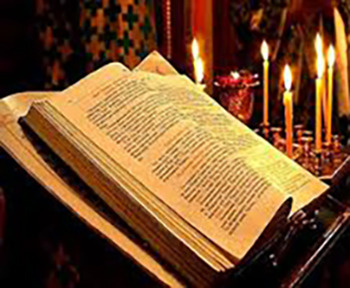
ISAIAH 29:13-23
13 Therefore the Lord said: “Inasmuch as these people draw near with their mouths And honor Me with their lips, But have removed their hearts far from Me, And their fear toward Me is taught by the commandment of men, 14 Therefore, behold, I will again do a marvelous work Among this people, A marvelous work and a wonder; For the wisdom of their wise men shall perish, And the understanding of their prudent men shall be hidden.” 15 Woe to those who seek deep to hide their counsel far from the Lord, And their works are in the dark; They say, “Who sees us?” and, “Who knows us?” 16 Surely you have things turned around! Shall the potter be esteemed as the clay; For shall the thing made say of him who made it, “He did not make me”? Or shall the thing formed say of him who formed it, “He has no understanding”? 17 Is it not yet a very little while Till Lebanon shall be turned into a fruitful field, And the fruitful field be esteemed as a forest? 18 In that day the deaf shall hear the words of the book, And the eyes of the blind shall see out of obscurity and out of darkness. 19 The humble also shall increase their joy in the Lord, And the poor among men shall rejoice In the Holy One of Israel. 20 For the terrible one is brought to nothing, The scornful one is consumed, And all who watch for iniquity are cut off— 21 Who make a man an offender by a word, And lay a snare for him who reproves in the gate, And turn aside the just by empty words. 22 Therefore thus says the Lord, who redeemed Abraham, concerning the house of Jacob: “Jacob shall not now be ashamed, Nor shall his face now grow pale; 23 But when he sees his children, The work of My hands, in his midst, They will hallow My name, And hallow the Holy One of Jacob, And fear the God of Israel.
GENESIS 12:1-7
1 Now the Lord had said to Abram: “Get out of your country, From your family And from your father’s house, To a land that I will show you. 2 I will make you a great nation; I will bless you And make your name great; And you shall be a blessing. 3 I will bless those who bless you, And I will curse him who curses you; And in you all the families of the earth shall be blessed.” 4 So Abram departed as the Lord had spoken to him, and Lot went with him. And Abram was seventy-five years old when he departed from Haran. 5 Then Abram took Sarai his wife and Lot his brother’s son, and all their possessions that they had gathered, and the people whom they had acquired in Haran, and they departed to go to the land of Canaan. So they came to the land of Canaan. 6 Abram passed through the land to the place of Shechem, as far as the terebinth tree of Moreh. And the Canaanites were then in the land. 7 Then the Lord appeared to Abram and said, “To your descendants I will give this land.” And there he built an altar to the Lord, who had appeared to him.
#orthodoxy#orthodoxchristianity#spirituality#easternorthodoxchurch#originofchristianity#holyscriptures#bible#old testament#wisdom#saints
2 notes
·
View notes
Text
Saints&Reading: Thursday, April 11, 2024
march 29_april 11
VENERABLE JOHN, ANCHORITE OF EGYPT (4th c.)
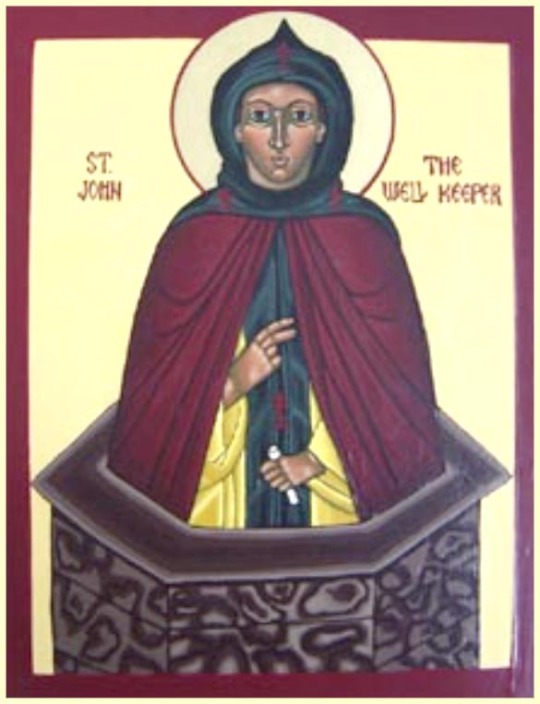
Saint John the Anchorite: During a persecution against Christians, the devout widow Juliania of Armenia hid from pursuers together with her two young children John and Themistea. She taught her children to pray and to read the Holy Scriptures.
From time to time John secretly visited a nearby monastery, thereby placing himself in danger. Once, a pious old man advised him to find a more secluded place for prayer. Returning home, the saint told his mother that he was going to visit the Elder. Thinking that her son would soon return, she let him go.
John went to the desert-dweller Pharmutios and received his blessing to live alone in the wilderness. The young ascetic found an abandoned well, which was filled with snakes, scorpions and other vile creatures. He lowered himself into the well and lived there for ten years in fasting, vigil, and prayer.
The angel who brought food to the hermit Pharmutios also brought bread for Saint John. The angel did not bring the bread directly to John, however, lest the young ascetic become filled with pride. Food was sent to him through his spiritual Father, Pharmutios.
Saint John had many temptations from the devil to test him. Demons assumed the appearance of his mother, his sister, his relatives and acquaintances in order to sadden the ascetic and compel him to give up his ascetic struggles. With tears they approached the well one after the other, begging Saint John to leave with them. All this time the saint did not cease to pray. Finally he said, “Be gone from me,” and the demons vanished.
Saint John lived in the well until the time of his blessed repose. Through God’s providence, Saint Chrysikhios, who had struggled in the desert for thirty years, came to bury him. On the eve of his repose, Saint John told Chrysikhios of his life and struggles for salvation. After his death, numerous miracles occurred at the place of his ascetic deeds.
THE MONASTICS MARK, JONA AND VASSA OF THE PSKOV MONASTERY (1480)

Saints Mark, Jonah, and Vassa are venerated as the founders of the Pskov Caves monastery.
It is not known exactly when the first hermit monks settled by the Kamenets stream in the natural caves of the hill, which the local inhabitants called “the holy hill.” The monastery Chronicle presents an account of eyewitnesses, hunter-trappers from Izborsk nicknamed Selishi: “We came with our father to the outlying hill where the church of the Mother of God is now, and heard what seemed to be church singing. They sang harmoniously and reverently, but the singers could not be seen, and the air was filled with the fragrance of incense.”
Of the first Elders of the Pskov Caves monastery only Mark is known by name. The Chronicle says of him: “In the beginning, a certain Elder was living at the Kamenets near the cave. Some fishermen saw him by the three rocks above the cave of the Most Holy Theotokos church, but they were unable to discover who he was, his lineage, how and from whence he came to this place, how long he dwelt there, or how he died.”
The second igumen of the Caves monastery is identified as Elder Mark in the monastery Synodikon. Saint Cornelius (February 20) doubted the veracity of this inscription and ordered that the name be removed from the Synodikon. Suddenly he became grievously ill and it was revealed to him that this was his punishment for ordering the name of Saint Mark to be stricken from the monastery diptychs.
After begging forgiveness at the grave of the Elder Mark, Igumen Cornelius restored his name. When the cave church of the Dormition of the Most Holy Theotokos was dug out and the burial caves expanded, the igumen Dorotheus found the grave of Saint Mark in a state of neglect, but his relics and clothing were preserved.
In the year 1472, the peasant Ivan Dementiev cut down the forest on the hill. One of the felled trees rolled down the hill, uprooting another tree from the ground. The slide opened up the entrance to a cave, over which was the inscription: “The cave built by God.” There is a tradition that Saint Barlaam, a fool-for-Christ, frequently came to the cave and wiped out this inscription, but it miraculously reappeared every time.
The priest John (nicknamed “Shestnik”) came to this holy spot, where the first ascetics prayed. He was a native of “the Moscow lands” and served as priest at Iuriev (now Tartu) in “a right-believing church, established by people from Pskov” and dedicated to Saint Nicholas and the Great Martyr George. He and the priest Isidore spiritually nourished the Russians living there.
In 1470, Father John was compelled to flee to Pskov with his family because of persecution by the German Catholics. When he learned of the martyric death of Saint Isidore (January 8), Father John decided to settle in the newly-appeared “cave built by God,” so that there, on the very boundary with the Livonians, he might found a monastery as an outpost of Orthodoxy.
Soon his wife fell ill and died after receiving monastic tonsure with the name Bassa. Her righteousness was evidenced immediately after her death. Her husband and her spiritual Father buried Saint Bassa (March 19) in the wall of “the cave built by God,” but at night her coffin was “taken from the ground by an invisible power of God.”
Father John and Saint Bassa’s Father Confessor were upset, thinking that this had occurred because they had not done the complete Service for the Departed. So they sang the funeral service a second time, and they buried the body again. In the morning, however, it was found above ground. Then it was clear that this was a sign from God, so they dug Saint Bassa’s grave on the left side of the cave. Shaken by the miracle, John became a monk with the name Jonah and devoted himself even more fervently to spiritual struggles.
He dug out the cave church and built two cells on pillars, then petitioned the clergy of the Pskov Trinity cathedral to consecrate it, but they decided not to do so at the time “because of its unusual location.” Then Saint Jonah sought the blessing of Archbishop Theophilus of Novgorod.
On August 15, 1473 the cave church was consecrated in honor of the Dormition of the Most Holy Theotokos. During the consecration there was a miracle from an icon of the Dormition of the Most Holy Theotokos:1 a blind woman “sent by the merciful God, beginning His great gifts to His All-Pure Mother” received her sight.
The date of the consecration of the cave church is regarded as the official date of the founding of the Pskov Caves monastery. Saint Jonah labored at the Cave monastery until 1480, then peacefully fell asleep in the Lord. Upon his death they discovered a chain mail coat on his body. This was hung over his grave as a sign of his secret asceticism, but it was stolen during a German invasion.
The relics of Saint Jonah rest in the Caves beside the relics of the Elder Mark and Saint Bassa. Once, when the monastery was besieged, the Livonian knights wanted to open the lid of Saint Bassa’s coffin with a sword, but fire spurted forth from the coffin. Traces of this punishing fire may still be seen on the coffin of Saint Bassa.
1 This icon, which they call the “old” to distinguish it from another wonderworking icon of the Dormition of the Most Holy Theotokos with scenes of Her life around the borders, was painted around 1421 by the Pskov iconographer Alexis Maly, and is now kept in the altar of the Dormition church. The icon with scenes around the border is the Cave church’s patronal icon.


ISAIAH 28:14-22
14 Therefore hear the word of the Lord, you scornful men, Who rule this people who are in Jerusalem, 15 Because you have said, “We have made a covenant with death, And with Sheol we are in agreement. When the overflowing scourge passes through, It will not come to us, For we have made lies our refuge, And under falsehood we have hidden ourselves.” 16 Therefore thus says the Lord God: “Behold, I lay in Zion a stone for a foundation, A tried stone, a precious cornerstone, a sure foundation; Whoever believes will not act hastily. 17 Also I will make justice the measuring line, And righteousness the plummet; The hail will sweep away the refuge of lies, And the waters will overflow the hiding place. 18 Your covenant with death will be annulled, And your agreement with Sheol will not stand; When the overflowing scourge passes through, Then you will be trampled down by it. 19 As often as it goes out it will take you; For morning by morning it will pass over, And by day and by night; It will be a terror just to understand the report.” 20 For the bed is too short to stretch out on, And the covering so narrow that one cannot wrap himself in it. 21 For the Lord will rise up as at Mount Perazim, He will be angry as in the Valley of Gibeon— That He may do His work, His excellent work, And bring to pass His act, His unusual act. 22 Therefore, do not be mockers, Lest your bonds be made strong; For I have heard from the Lord God of hosts, A destruction determined even upon the whole earth.
GENESIS 10:32-11:9
32 These were the families of the sons of Noah, according to their generations, in their nations; and from these the nations were divided on the earth after the flood.
1 Now the whole earth had one language and one speech. 2 And it came to pass, as they journeyed from the east, that they found a plain in the land of Shinar, and they dwelt there. 3 Then they said to one another, “Come, let us make bricks and bake them thoroughly.” They had brick for stone, and they had asphalt for mortar. 4 And they said, “Come, let us build ourselves a city, and a tower whose top is in the heavens; let us make a name for ourselves, lest we be scattered abroad over the face of the whole earth.” 5 But the Lord came down to see the city and the tower which the sons of men had built. 6 And the Lord said, “Indeed the people are one and they all have one language, and this is what they begin to do; now nothing that they propose to do will be withheld from them. 7 “Come, let Us go down and there confuse their language, that they may not understand one another’s speech.” 8 So the Lord scattered them abroad from there over the face of all the earth, and they ceased building the city. 9 Therefore its name is called Babel, because there the Lord confused the language of all the earth; and from there the Lord scattered them abroad over the face of all the earth.
#orthodoxy#orthodoxchristianity#easternorthodoxchurch#originofchristianity#spirituality#holyscriptures#bible#old testament#wisdom#saints
1 note
·
View note
Text
Saints&Reading; Wednesday, April 10, 2024
march 27_april 10
VENERABLE HESYCHIUS OF JERUSALEM (C.408)

He was a priest-monk renowned in the Eastern Church as a theologian, biblical commentator, and preacher. He played a prominent role in the 5th-century controversy on the nature of Christ and was acclaimed as having annotated the whole of sacred Scripture.
Serving as a priest in the church in Jerusalem c. 412, Hesychius gained repute as a theologian and catechist so that by 429, he was recognized by chroniclers and the Orthodox Mēnologion (lives of the saints liturgically arranged by month) as the pre-eminent biblical interpreter and teacher of the church in Jerusalem and Palestine.
Most of Hesychius’ writings have been lost, although scholarship in the second half of the 20th century continues to identify more of his works hidden among Greek manuscripts and Latin translations. His biblical commentaries include interpretations of the Old Testament books of Leviticus, Job, Isaiah, and Ezekiel. A celebrated moralistic annotation on the Psalms that had long been attributed to the 4th-century spokesman for orthodoxy, Athanasius of Alexandria, is now acknowledged as Hesychius’. Some earlier commentaries of probable authenticity contain germinal terminology of the heterodox Nestorians.
As a biblical exegete, Hesychius generally followed the allegorical method of the 3rd-century Christian theologian Origen of Alexandria. Hesychius’ preoccupation with symbolism led him to deny that a literal meaning could be found for every sentence in the Scriptures. In order to avoid heretical interpretations of Scripture, he rejected such philosophical terms as person, essence, or substance to express doctrine on the nature of Christ. On this point, he allowed only the term logos sarkotheis (“the word made flesh”), a biblical concept. Against the diminution of Christ’s divinity by Arius and his Antiochene followers, he veered toward the view of the Monophysites.
Credited with the earliest known liturgical addresses on the Virgin Mary, Hesychius also wrote a church history after 428 that controverted Nestorianism and other heretical beliefs. This text was incorporated into the second Council of Constantinople proceedings in 553. The works of Hesychius were published in the series Patrologia Graeca, J.-P. Migne (ed.), vol. 27, 55, and 93 (1866).
Source: Encyclopedia Britannica
THE MONKMARTYR EUSTRATIUS OF THE KIEV NEAR CAVE (1096)

Martyr Eustratius of the Caves was born in the eleventh century at Kiev into a wealthy family. As an adult, he received monastic tonsure at the Kiev Caves monastery, after giving away all his possesions to the poor. Saint Eustratius humbly underwent obediences at the monastery, strictly fulfilling the rule of prayer and passing his days in fasting and vigilance.
In 1096 the Polovetsians captured Kiev and ravaged the monastery of the Caves, doing away with many of the monks. Saint Eustratius was taken into captivity, and was sold into slavery with thirty monastic laborers and twenty inhabitants of Kiev to a certain Jew living in Korsun.
The impious Jew tried to make the captives deny Christ, threatening to kill those who refused by starving them. Saint Eustratius encouraged and exhorted his brother Christians, “Brothers! Let none of us who are baptized and believe in Christ betray the vows made at Baptism. Christ has regenerated us through water and the Spirit. He has freed us from the curse of the Law by His Blood, and He has made us heirs of His Kingdom. If we live, we shall live for the Lord. If we die, we shall die in the Lord and inherit eternal life.”
Inspired by the saint’s words, the captives resolved to die of starvation, rather than renounce Christ, Who is the food and drink of Eternal Life. Exhausted by hunger and thirst, some captives perished after three days, some after four days, and some after seven days. Saint Eustratius remained alive for fourteen days, since he was accustomed to fasting from his youth. Suffering from hunger, he still did not touch food nor water. The impious Jew, seeing that he had lost the money he had paid for the captives, decided to take revenge on the holy monk.
The radiant Feast of the Resurrection of Christ drew near, and the Jewish slave owner was celebrating the Jewish Passover with his companions. He decided to crucify Saint Eustratius. The cruel tormentors mocked the saint, offering to let him share their Passover meal. The Martyr replied, “The Lord has now bestown a great grace upon me. He has permitted me to suffer on a cross for His Name just as He suffered.” The saint also predicted a horrible death for the Jew.
Hearing this, the enraged Jew grabbed a spear and stabbed Saint Eustratius on the cross. The martyr’s body was taken down from the cross and thrown into the sea. Christian believers long searched for the holy relics of the martyr, but were not able to find them. But through the Providence of God the incorrupt relics were found in a cave and worked many miracles. Later, they were transferred to the Near Caves of the Kiev Caves monastery.
The prediction of the holy Martyr Eustratius that his blood would be avenged was fulfilled soon after his death. The Byzantine Emperor issued a decree expelling all Jews from Korsun, depriving them of their property, and putting their elders to death for torturing Christians. The Jew who crucified Saint Eustratius was hanged on a tree, receiving just punishment for his wickedness.
Source: Orthodox Church in America_OCA

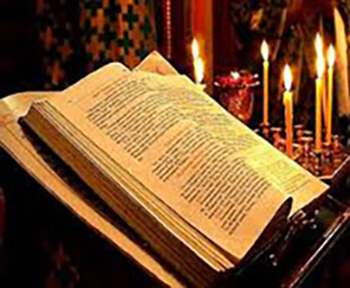
ISAIAH 26:21-27:9
21 For behold, the Lord comes out of His place To punish the earth's inhabitants for their iniquity; The earth will also disclose her blood, And will no longer cover her slain.
1 In that day the Lord with His severe sword, great and strong, Will punish Leviathan the fleeing serpent, Leviathan that twisted serpent; And He will slay the reptile that is in the sea. 2 In that day sing to her, “A vineyard of red wine! 3 I, the Lord, keep it, I water it every moment; Lest any hurt it, I keep it night and day. 4 Fury is not in Me. Who would set briers and thorns Against Me in battle? I would go through them, I would burn them together. 5 Or let him take hold of My strength, That he may make peace with Me; And he shall make peace with Me.” 6 Those who come He shall cause to take root in Jacob; Israel shall blossom and bud, And fill the face of the world with fruit. 7 Has He struck Israel as He struck those who struck him? Or has He been slain according to the slaughter of those who were slain by Him? 8 In measure, by sending it away, You contended with it. He removes it with His rough wind on the day of the east wind. 9
Therefore, by this, Jacob's iniquity will be covered; and this is all the fruit of taking away his sin: When he makes all the stones of the altar like chalkstones that are beaten to dust, wooden images and incense altars shall not stand.
GENESIS 9:18-10:1
18 Now the sons of Noah who went out of the ark were Shem, Ham, and Japheth. And Ham was the father of Canaan. 19 These three were the sons of Noah, and from these the whole earth was populated. 20 And Noah began to be a farmer, and he planted a vineyard. 21 Then he drank of the wine and was drunk, and became uncovered in his tent. 22 And Ham, the father of Canaan, saw the nakedness of his father, and told his two brothers outside. 23 But Shem and Japheth took a garment, laid it on both their shoulders, and went backward and covered the nakedness of their father. Their faces were turned away, and they did not see their father’s nakedness. 24 So Noah awoke from his wine and knew what his younger son had done to him. 25 Then he said: “Cursed be Canaan; A servant of servants He shall be to his brethren.” 26 And he said: “Blessed be the Lord, The God of Shem, And may Canaan be his servant. 27 May God enlarge Japheth, And may he dwell in the tents of Shem; And may Canaan be his servant.” 28 And Noah lived after the flood three hundred and fifty years. 29 So all the days of Noah were nine hundred and fifty years; and he died.
1 Now this is the genealogy of the sons of Noah: Shem, Ham, and Japheth. And sons were born to them after the flood.
#orthodoxy#orthodoxchristianity#easternorthodoxchurch#originofchristianity#spirituality#holyscriptures#bible#old testament#wisdom#saints
3 notes
·
View notes
